#wow marco is so problematic
Text
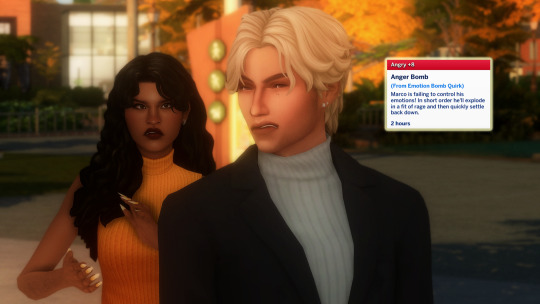


Renee and Vincent had just visited the hospital when they saw a toddler crying alone on a bench. Vincent couldn't bear to see this happening and rushed over to help. "I hate D-Daddy!" he cried through muffled sobs. "Hey, that's my son!" someone yelled. He picked up the kid and went to the guy.

It was clear to Marco that Casper was refusing to let go of the stranger's arms and he dramatically sighed, "If you don't give him back, I'm calling my lawyer!" Oh he had the audacity to blame him even though it was his own fault his son would much rather stay in this stranger's arms. And this stranger was also a lawyer.
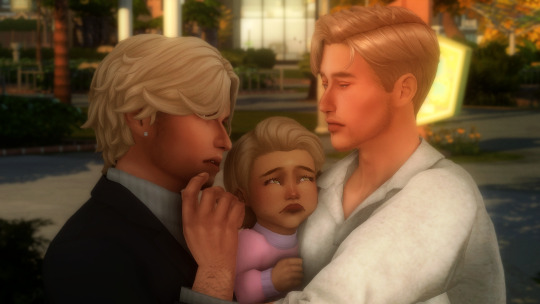
Vincent had no idea who this problematic guy was but he was hella annoying! He had a hunch of what was happening and had dealt with cases like this before. Seeing the pleading eyes of the kid in his arms reminded him of the neglect from his own father.

"For fuck sake Marco," Petrah cursed under her breath, "Honey! Let's not make a scene, there are people here," she shot secret daggers at him, worried about her reputation. If paparazzi saw any of this-
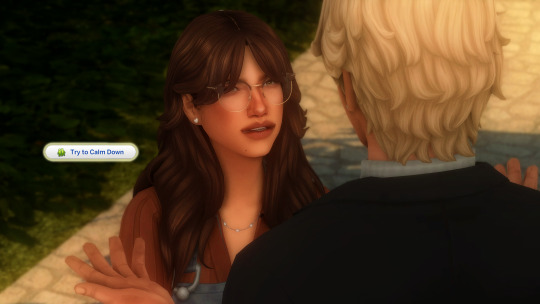
Then Renee came over, "Calm down sir." When he wouldn't, she gave up and showed her police ID. Marco recognised her but couldn't quite place when they'd met. But she was a detective and he didn't want to get into trouble. You're in deep shit now Marco...
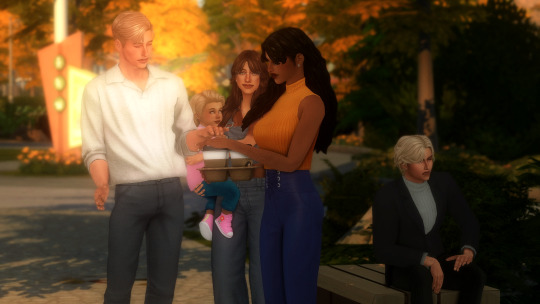
"I apologise for my husband's childish outburst but I can explain." With her best acting skills, Petrah explained the situation her own way. "Let me buy you some drinks perhaps?" she didn't want to get into trouble either and surprisingly settled all the misunderstandings.
#ts4#sims 4#ts4 gameplay#ts4 legacy#postcard legacy#postcard gen 3#renee reichmann#vincent kingsley#marco montalvo#casper montalvo by tulipsimss#petrah apple by tulipsimss#wow marco is so problematic#hes waaaay worse than i thought#look at petrah saving his ass!!!#oh they were this close to getting found out and being investigated#ofc they got away with it#her acting skills playing innocent smh#if you think about it vincent has held casper in his arms for longer than BOTH marco and petrah COMBINED 😭😭😭#tulipsimss collab
94 notes
·
View notes
Note
When you were younger and watched Violetta, what was differerent with how you thought compared to today, and what is the exact same in your experience watching today?
Here’s a list of things I thought about the show when I was a kid that I absolutely do not think anymore:
I thought Matias was funny
I also found Jade annoying, even if I could find her funny too
I didn’t like Gregorio
There was a small, dark period of time where I thought Priscila was ok (didn’t last for too long luckily)
I thought the Roxy and Fausta plot was the funniest thing ever (though I still think the concept of the characters are fun, but the actual plot and use for them is 😶)
I thought Tomas was better than Diego 🫠
It’s hard to remember everything, there were probably a lot of smaller things too, like some scenes or eps I just changed my mind about later.
Now, here’s things that always has been the same for me:
My love for Leonetta. Always big. Always there.
I essentially have the same opinion about every ship, only that I may not feel as strongly about them at all times, or feel more strongly.
Some scenes I always react the same to. Like, the ”the kiss was my kiss” scene and the 2x20 non-con kiss always brings me rage. There’s also a million scenes that brings me just as much serotonin as the first time I watched them.
I always, ALWAYS, dislike Germangie. It felt just as weird when I was 12 that they were endgame as it feels now
My favorite songs have not changed at all. My least favorite songs change every other hour, but my top 10 songs? Always the same. Guess once which song is on top and I’ve been blasting since I was 11 ;)
The way I analyse this show. Of course, as an 11 year old, I couldn’t analyse the show in the same way, but I always had an interest to. Much because, I felt like everyone else who watched ”just watched”. I had a ”no one else understands the depth of this show besides me” moment. Not only because, the loudest V-lovers were like 8 years old, and I felt at times too old to watch. But in reality, this show was really more for preteens, even if they marketed it like a preschool show
My favorite episodes then are still my favorite episodes today
My favorite characters have not changed
While I’ve appreciated the adults more now, I still will take the kids sides a lot. Especially Violetta’s. Many people think she’s annoying in early S1, but they fail to remember she hasn’t had the time to become her best self yet, because she’s so stuck and hasn’t been allowed to explore herself with her overprotective father
And here are things I didn’t think about as a kid and I thought about now:
How unbelievavbly on crack the show is. I knew it was chaotic from childhood but at THIS level of insanity?
How fruity the show is. I think it’s a universal experience to rewatch the show as you’re older and realize ”wow, this is fruitier than I remember”
And with that, I certainly did not realize like… how the real love triangle in S3 was between Naty, Ludmi and Cami? Not to mention FRANLETTA????
Franletta is interesting though cause Fran has always been my favorite character. But I never really… cared much about her love life. I liked her and Marco a lot. Honestly I always assumed they would’ve been endgame. I wonder if they were thought to be it, but due to Xavi leaving the show, they had to change it. Or, they were planning on having some love triangle between Marco, Diego and Fran, but had to change it to ”Diecesca hiding from Violetta”. Idk, that plot felt like not their first choice. I have however, always loved Francesca around her friends. Especially her relationship with Violetta. So really, I’ve always been ready to ship them without knowing it at first.
Really started to see more perspectives and be able to see some things from different character’s POV.
Also realized the more problematic aspects of the show… of course not only the whole deal with the censored episode and the really uneccessary depiction of the chinese restaurant workers, but also how there’s ableism and at times they just joke about people’s mental health and don’t take it too seriously. Also how quickly everyone forgets each other for non-consentual actions. Much of this is also problems in other DCLA shows. I feel like with every new show they go one step forward and two steps back with some things.
So yeah, it’s not all sunshine and rainbows, but I am glad I can recognize the problems too and call them out.
In the end though, this show will always mean so much to me and I can enjoy it just as much now as I did then, even if I may enjoy it for other aspects now.
4 notes
·
View notes
Note
hottest players for you?
HMM OKAY sorry this took way more time than you probs expected but ive been thinking abt this very hard. disclaimer some of these guys i dont know a lot abt i just found them hot when i watched them so if anyone’s problematic im so sorry skdhdkjd. in no particular order:
(under the cut bc holy fuck this got longer than i expected. i feel like i dissected my own brain and also i think i have too much thirst…….)
robert lewandowski - he has sculpted abs okay im not immune. like every time he pulls off his shirt? after making the hottest goals look easy? hell yes. and also his eyes hi hello let me stare at them forever.
manuel neuer - listen,,,,, he’s tall and blonde and has an ass to die for. his face looks like it was sculpted by the gods. esp schalke manu holy fuck i love him now but back then? he looked like an angel and i want to ruin him, i want to do unspeakable things that will result in his fall from heaven
marco reus - controversial ik but there’s Something about him. i can’t place it. he’s just rly hot at specific angles. like in that one specific gif i did of him with the leather jacket and the styled hair my god
thomas müller - similar to the above, at certain angles my mind goes hmmm hello. also his whole energy is so hot like wow. AND he’s so expressive and when he opens his mouth in frustration? well i think Thoughts
kevin trapp - listen. he’s unreal. like objectively, what the actual fuck.
mats hummels - exactly like the above, with the added bonus of being a pathetic little sexy man
serge gnabry - esp when his hair is fluffy. i just love his cheeks and also the way he has a fashion sense
benjamin pavard - i blame the benjigate of a few weeks ago
benedikt höwedes - when he had hair. sorry im not into bald men SKDHDKDHKD and also the old germany nt vibes are mwah
miroslav klose - speaking of old germany nt vibes,,,,,, this guy was sexy in such a pure kinda way it’s insane. i didn’t always like his hairstyle but when it was done right ugh take me now
kostas tsimikas - i blame the kostasgate of a few weeks ago. and also his tattoos are surprisingly also rly hot (unlike every other goddamn footballer)
virgil van dijk - his face? wow. unreal. and the height mm yes im into it. moreso when he’s wearing jackets v specifically
simon kjær - i miss him and his sexy strong presence. there’s like this one particular gif of him grinning as someone who’s about to help him up strokes his face and it lives rent free in my mind
alvaro morata - im so sorry i don’t know why either but somehow he’s honest to god my type. but only when his hair isn’t too short.
son heung-min - not a spurs fan but i. don’t even know what to say. he’s just hot. if you don’t see it then you are wrong. and also i was hooked ever since i saw that puskas goal.
paulo dybala - i probs know this guy the least out of these names here but god he’s just so so so hot goodbye what a face
james rodriguez - similar attraction as with the above and i also don’t know him v well. his career died but he’s still so hot in a boyish way
xabi alonso - jesus what i’d let this man do to me. he’s just so fucking sexy and the spanish is not helping. and when he puts on a suit? yeah hahahahahaha im unwell
iker casillas - also retired but at the start of my football obsession i started watching stuff on spain’s golden era and he was my first player crush okay i don’t understand either. specifically when he was wearing those short sleeved kits back when long sleeves were the standard for goalies mmm yes
BONUS: olivia mcdaniel - goalkeeper for the ph wnt and god her thighs could crush me. and she wears these short fucking shorts and the way she looks on the ground making saves hhhhhhh im unwell. i’ve been kind of obsessed for the past month tbh (shoutout to sami for listening to my gay af rambles)
i may have forgotten someone but this is already so long so. well.
aaaaand special mention to all the other players whom ive thirsted for on this blog but aren’t on this list bc my attraction is such a fickle thing that is easily influenced by particularly good photos of them <3 and sometimes ppl are objectively hot and look good and all but just aren’t my type rly
#god this is long whats wrong with me#I DIDNT EXPECT THIS OKAY#i didnt even put the most cursed ones here#like yeah some of these are probs slightly questionable#but i tried to keep this one as legit as possible#thank you for asking anon i think i went thru several crises thruout the making this list#of*#asks#anon
24 notes
·
View notes
Text
STARCO OVERVIEW - Season 2 (part 1)

SEASON 1
SEASON 2 (part 1) (part 2)
SEASON 3 (Incoming)
SEASON 4 (Incoming)
MY NEW WAND (2x01a)
Ignoring all the questions that naturally come with a season premiere opening on Star videochatting in the bathroom while Marco is taking a shower - questions that usually lead to “why the shit did they need four seasons to start smooching”, My New Wand finally introduces the idea that Star might feel something more than friendship for Marco. We aren’t told what she wrote in her diary (even if we know now, thanks to the Book of Spells, and it’s essentially a slightly more consciously skewed toward romance version of Marco’s “I felt like this since the beginning” in Here to Help),

but the structure of the scene and the “diary of a teenage girl which can’t be seen by her bestie” clearly directed the attention of the viewers in a very defined direction. One subtly highlighted by the super inconspicuous shape of the key (sure, lots of Star’s spells and elements are heart shaped or themed, but in this specific case having the concepts such as “heart” “key” “secret diary” and “crush” all in one shot is suspicious at the very least).

As usual, UNCONSCIOUS FEELINGS: Star was generically embarrassed about Marco reading her diary, because that’s something any teen girl would do. She wasn’t consciously crushing on Marco yet at this point, at most she sometimes felt things like “wow he’s cute” and stuff like that on top of an incredibly strong relationship. It’s akin to what Marco experiences in Blood Moon Ball, but since Star is more “aggressive” with her feelings, and since Marco is going to get serious with Jackie, she’s going to consciously include “romantic attraction” in the recipe of her friendship with Marco about half a season earlier than him.
Another important element in the episode is the introduction to dipping down, a proper version of what Star did in Storm the Castle. Long story short, as Moon tells Star, the key to dipping down are strong emotions.

Wanting to save Marco when Toffee kidnapped him, being embarrassed about him reading her diary here. I’m not saying that Marco is the only key to Star’s maturing, obviously - and later on she’s going to dip down even more for reasons not directly connected to him, but this early in the show he always is, one way or another, the focal point of her character arc, and Glossaryck knows it and uses him to teach his problematic student in unorthodox ways - it’s clear that he’s the one who closed Marco in the closet in this episode, and directed him toward Star’s diary, well knowing that it might have helped her get a first feeling of what dipping down is like. He literally says that finding Star’s secret is the way to have her reach the chunks, which is what he used with her as a metaphor for channeling magic through dipping down.
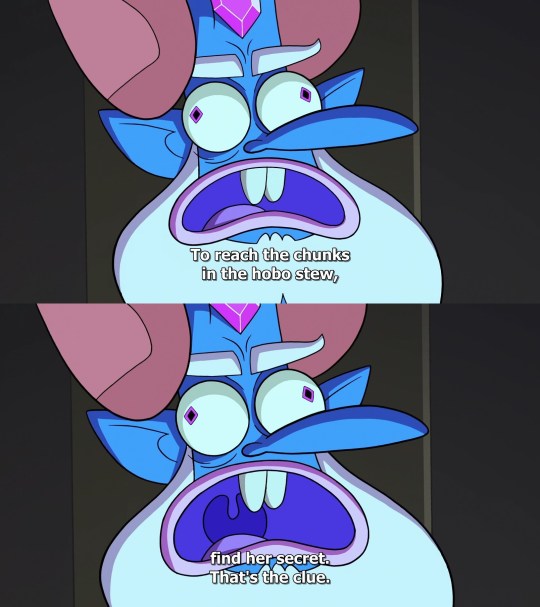
So strong emotions = dipping down --> Marco = source of very strong emotions for Star. Not the only source, but definitely the main one, especially in S1 and S2. This is an important point for Star’s whole character arc: it’s true that in S3 and S4 there are going to be less meaningful Star - Marco interactions, and that they’re both going to have many more moments of growth while interacting with other characters, but that’s the whole point of it. At the beginning of the series both dorks are walking disasters; by interacting together, by complementing each other and their shortcoming, they slowly mature into something better, individuals who are now ready to start stepping (slowly, very slowly, their journey won’t be complete until the end of the series) into the real world and take on it. So while I’m the first one who got frustrated and saddened by the relative lack of Starco moments in later seasons (relative is the keyword) it’s also important to keep in mind that it never meant that their relationship became less important and relevant, just that during their first months together they left a real and tangible effect on each other, leading to meaningful growth that allowed the writers to believably open up roads to different kind of interactions and “plot devices” for growth. This is what I mean when I say things like “meeting Marco is what allowed Star to defeat Toffee”. Obviously there are several degrees of separation, and several moments of growth / plot for Star that didn’t even involve Marco, but without their meeting she wouldn’t have matured as fast, she wouldn’t have had the opportunity to confront herself with a friend who was ready to help put some order in her super messed up life life. From the Book of Spells: “When we are together he sees the chaos in the world and sort of embraces it”. This is a direct quote from Star’s diary, something the writers of the show wanted to point out before S4 while referring to early S1 Star.
Marco has been, since the beginning, the first and most important key to Star’s development (even if not the only one), the “force” that first allowed her to start her journey toward maturity and become the kind of person who could go from being “a skimmer” to being proud of being “a dipper”. And in this S2 premiere we get a very direct taste of it, with Glossaryck using Marco as a bait to help Star learn.

Important bonus: the face Star makes for a handful of frames after having seen a naked Marco being YEETed across her room.

MR. CANDLE CARES (2x02a)
I wrote a lot about this episode in multiple posts, so I’m going to be extremely focused on the Star - Marco stuff only this time:
Marco smiles like that when he sees Star getting out from the office, and it endlessly warms my heart.

Both Star and Marco are clearly not thinking about each other in romantic terms in the slightest during this episode, the former harshly denying the possibility of any feeling for her bestie, the latter not being ashamed in the slightest about talking about creative making out techniques to trick Tom into revealing himself. And yet just two segments earlier Star didn’t want Marco to read a part of her diary where she might have said something crush-related. Unconscious feelings, Heart and Mind not agreeing on something, it’s always the same deal, the whole show is going to play with this idea of extreme disconnection between what one might feel and what one might consciously know they want (concept directly introduced in Sleepover) as a way to justify the ever growing emotional intimacy between Star and Marco while taking their sweet time to actually deliver any romance related developments. We all have to accept it, or it becomes frustrating and impossible to read some of the passages in the series, especially during S3 and early S4, because we’d get lost in trying to plot the trends of their feelings on a graph and that’s a fool’s errand. When the show wants to tell us “A CHARACTER FEELS SOMETHING STRONGLY AND THIS THING IS IMPORTANT” they’re not subtle about it, and that’s vastly more important than anything else.
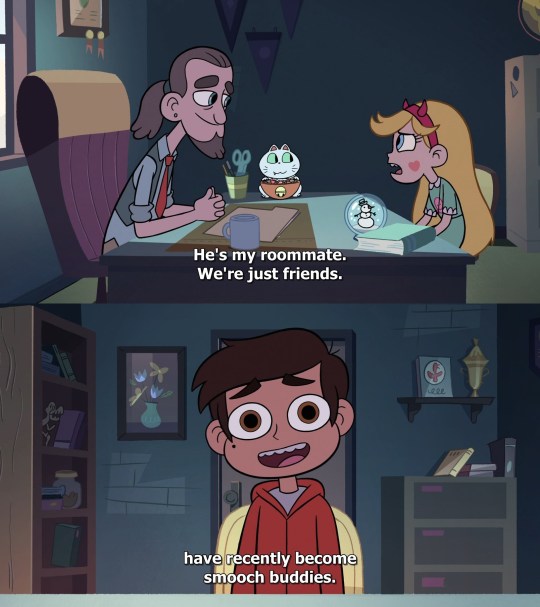
Marco stops playing to dreamingly appreciate Star and state how endearing he finds a part of her personality which might be frustrating to most (and it is to Tom, despite him also being attracted to it at the same time).
Appreciating your partners’ quirks is Love Story Writing 101, and this is going to be particularly evident in Curse of the Blood Moon (”I like every single thing about you”) and Here to Help (Star chuckling at Marco’s clumsiness). In this specific case it’s obviously premature to talk about “love” and it’s mostly a delicious bonus that presents a comparison between Tom and Marco, evidencing both their points in common (they’re both fascinated by Star’s personality and individuality) and differences (Tom is frustrated by this part of Star’s personality as well, since it doesn’t mix well with his controlling nature, while Marco learned to embrace it).

The important part, my favorite example to show people why and how Marco had an incredibly important influence on Star’s growth, especially during the first part of the series: Star spends most of the day panicking over Mr. Candle and then her mom’s words, she feels trapped in a role she didn’t want, lacking any freedom and prospect in life beyond her role as a future queen (interestingly she feels stuck in life, just like Marco in the following episode, but not out of lack of direction, but excess of it!). Then Marco gets home, talks to her for twenty seconds, and he immediately manages not only to calm her down, but he also gives her a new perspective on her life, and on her possibilities as a princess (and we know that she is definitely going to use her authority in her own way during S3), all of this while always following the style outlined by Blood Moon Ball: not a teacher or someone who tells her what she should do, just a friend nudging her in the right direction, telling her what she needed to hear. A Version 1.0 of his speech about finding your own happiness from Beach Day, in a way - the theme of free will and self determination was present since the beginning, even if at the time there obviously seemed to be less freedom in Star’s life, since she was supposed to inherit the throne, eventually.

Bonus points for the Alphonse The Worthy’s portrait from Blood Moon Ball moving his eyes to look at the two hugging, and for the demon highlighting with “point Marco” that he ultimately won the day when it came to wanting to be at Star’s side. Minus point for Star still acting coy at Tom’s compliment showing that she still had unresolved attraction for him.
RED BELT (2x02b)
The events of the episode itself aren’t particularly related to Starco, but it formally introduces Marco’s own “coming of age” arc, by telling us that he’s scared about being stuck in life, left without a goal or a purpose and without any meaningful connection. Needless to say that the “squire arc” from Sophomore Slump to The Knight Shift is going to address this, and that Star (as a person, but also as a mean to step into a bigger world) is going to be fundamental for Marco’s growth. While talking about the series premiere I mentioned that Star’s main role in Marco’s life is helping him become a better version of himself, stepping out of his comfort zone and managing to find his own path toward fulfillment and happiness, and Star is not just going to be extremely important for this, in different ways during the many different arcs, but she’s eventually going to be identified as THE single most important element. In The Knight Shift Marco is going to realize that he wants a lot of things from his life, that he wants to make experiences and slowly decide what he wants to do in the future without being scared about having to figure out everything here and now, lest being left behind, but he’s also going to realize that Star’s presence is essential to his happiness, that their relationship is the one lifelong post he feels like he has to commit, despite being just a teen with all his life in front of him.

So Red Belt doesn’t really have any relevant Starco interactions, but it introduces a part of Marco’s journey as a character that’s going to be incredibly connected to Star’s presence in his life.
As for the nightmare itself, don’t ask. It uses a lot of generic dream-like imagery to make things confusing and symbolic, with some elements from the first half of the season (Mr. Candle, the colors green and purple, associated to the magic subplot, the suit from Bonbon The Birthday Clown...). Maybe the Blood Moon being there was on purpose, a symbol for “you’re worried about having no goal in life, but your friend can be the key for you to gain maturity and fulfillment!”, maybe it was just “red belt, red balloon, spooky imagery... let’s put in the Blood Moon!”. Lots of things in visual media are done just for “rules of cool” or to give the scene a particular kind of mood that can help focus the attention of the viewers.
STAR ON WHEELS (2x03a)
This episode, in its extreme weirdness, is like an a super condensed recap of the important parts of Star and Marco’s relationship - with focus on the Star’s side of things, but there’s also some for Marco:
Star she gets excited about Marco teaching her something about Earth culture - riding a bike, which at the same time is also something new that could be compared to her getting her wand;
She overdoes and she messes up / can’t properly handle the situation;

Marco gets overwhelmed by this, but then learns to embrace the weirdness of Mewni / magic for Star’s sake (more or less like what happened in the first episode, or at least during her first encounters with Star and her world);

and Star has to come to terms with the fact that she’s in another dimension now, embracing part of it just like Marco did, and growing from it, and Marco has a big role in convincing her about it;

And while it’s at it, the episode includes other important themes (central to Star as a person in general, but in this case highlighted through her interactions with Marco), such as Star’s stubbornness and hostility toward doing and learning stuff when just told what to do,

and the resulting moment of learning and growth when Marco, instead of just “ordering her” what to do, gives her some of the trust that she desperately needs, and with it the confidence to actually try and succeed on her own (this all connects to the larger arc of Glossaryck teaching Star stuff in unconventional ways).

And since it never hurts we get reminded one more time how much Star resents being lied to and how important trust is to her.
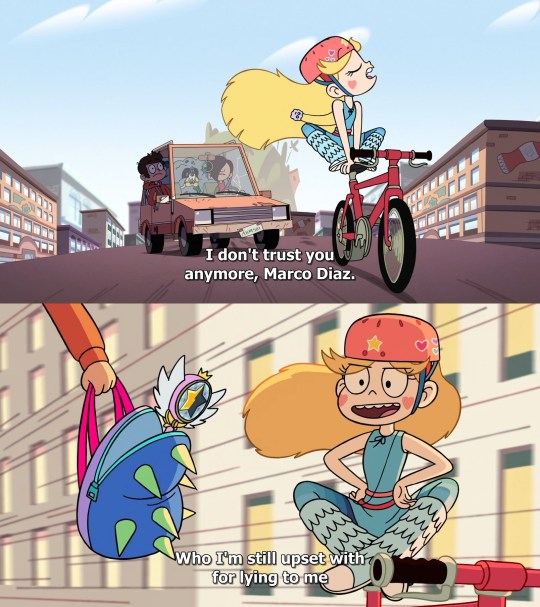
Obviously the whole episode is extremely silly, the whole situation requires a lot of suspension of disbelief to work and the “emotional moments” of the episode are extremely hammed up - we get a heartwarming “I trust you.” moment when the situation at hand involves learning to ride a bike! But it’s still a good way to have in a slick 11 minutes long package a super-cut of (part of) what Star and Marco brought into each other’s lives, and how that affected them and their way to interact with the world.
FETCH (2x03b)
Wow look in an episode that directly introduces the “stop running from your problems” arc for Star we get told by Sta herself that having your own Marco is important to give you the support you need to feel less overwhelmed by life - and thus less prone to ignore problems, it’s almost like he’s important to her in that way and that in Lint Catcher the dubbin vows when she makes him her squire further drive home the idea that he’s her ideal companion.

STAR VS ECHO CREEK (2x04a)
Another episode about “running away from problems”, in this case Star physically runs away from her problems and tries to avoid consequences. And sure, at the beginning of the episode Marco tries to tell her not to run away and we could argue once again about the positive influence and role Marco has on Star, but we know about it already. What’s REALLY important and huge is that by the end of the episode Star, the same person whose greatest fear in S1 was going to St. Olga and thus losing her freedom, gets convinced while talking with her own subconscious that going to prison (= facing problems and consequences instead of running away carefree) is a better alternative to never being able to see Marco again.
This is the same concept I talked about at the beginning of the post: it’s not like Marco is the ONLY important person in Star’s life, she obviously loves her family as well and in later seasons she’s going to interact with other characters as well, but at this point of the story Marco is the person who she actively cares the most about, and the one who better understands her (this is going to be a constant throughout the series, obviously), so almost all big moments of learning and self reflection for Star are somehow related to him. And while saying that Marco is the most important person in the world to Star (and vice versa) might not have been entirely correct by this point of the series (mostly because we lacked proper perspective), it becomes absolutely true by the end of it, as their choices in Cleaved highlight.
So yes, sure, logically speaking, and going beyond the simple plot of this episode, Star would have missed a number of persons if she spent her life hiding just to run away from her problems, but as far as early S2 experiences and subconscious goes, it all relates back to Marco, one way to another. After all we know that they both had an intense and special relationship from the beginning, and it’s going to keep being something unique that they don’t share with anyone else throughout the whole show, even when they’re going to date other people, even when there aren’t going to be as many episodes featuring both of them together.
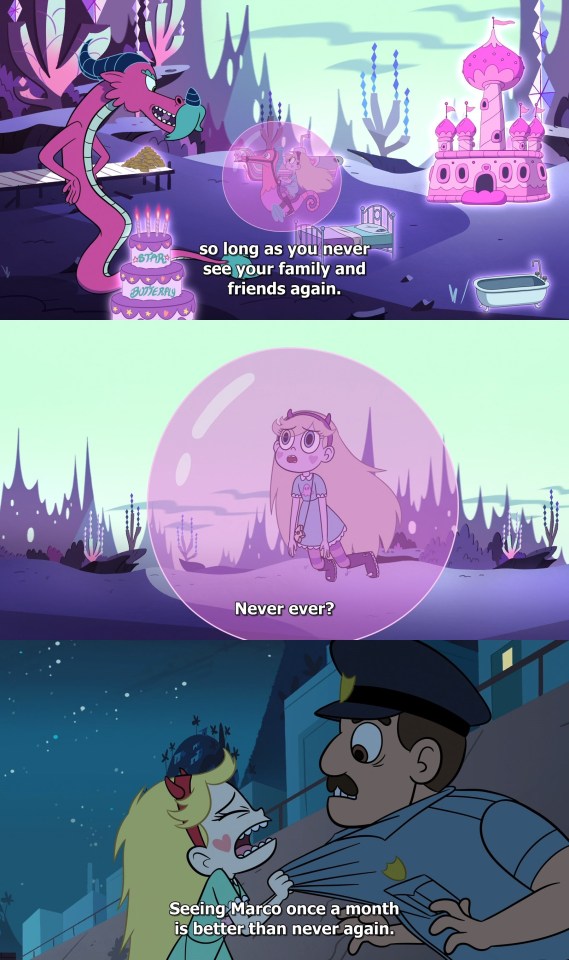
Bonus gratuitously adorable shot. Marco didn’t love-love Star from the beginning, we know that, but Gloss damnit, did he LOVE her from the beginning. I know that the series might not have had the best of pacing and some choices concerning shipping planted doubts and frustration in many fans, but no other two characters in the series come even remotely as close to Star and Marco when it comes to unabashedly caring about the other to incredibly extremes. THIS is what Marco means when he says that he felt like this from the beginning, and THIS is what Star means when she says (albeit in her diary in the Book of Spells) that she never connected with anyone else in the same way. This has never changed in intensity throughout the show (if anything it grew), even if it got the spotlight of an episode way less frequently.

WAND TO WAND (2x04b)
Yet another episode about Star learning not to avoid problems and responsibilities as much, and another episode that doubles down of how important Star’s feelings for Marco (I mean “feelings” in the broadest possible term, not as in “still unconscious crush” only) are for her magic. I already said this like five times, but I really want for the point to come across: I’m not saying that everything Star does, learns, or everything concerning her magic, has to relate to Marco, Starco, or to her growing crush on him, nor that Marco is the only one who ever helps Star grow. What I mean is that during all of S2 Marco is the single biggest source of feelings for Star, and this includes good stuff and negative stuff, such as all the emotional turmoil cased by Jarco. But this all plays into helping Star mature, culminating in Starcrushed. The S2 finale constitutes the climax to Star’s “stop running away from problems” arc, culminating in her accepting her role as a princess and going off to face Toffee, but this goes hand in hand with confessing her crush to Marco. Star finds the determination to grow and take The Plot™ head on, thus eventually saving Mewni (multiple times), and this part of her character arc is inextricably connected to her “learn to admit your own feelings for Marco” arc. THIS is what establishes their relationship as utterly special, and what allows me to claim that Marco had a fundamental role in Star’s coming of age story, well beyond the limits of what he personally and actively did with and for her.
When the series shows us that Marco is the key to Star tapping into her magic and better learning to use it it’s not because of some lore or plot related connection between the two, or between Starco and Magic - we have seen that’s not the case: magic is connected to emotions, and Marco happens to be the single biggest source of emotions for Star. That’s what it’s all about.
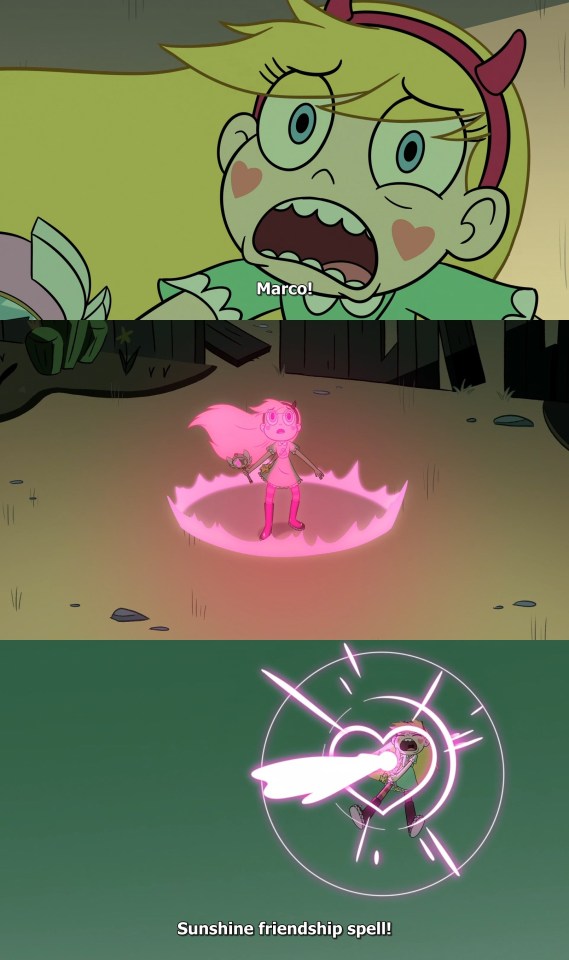
The episode ends with Star using brooms to fix her messes instead of magic, which is yet again a nice moment of “Star embracing part of Marco’s world”, but it’s not really that important in the big picture since it’s not like Earth’s ways are inherently better, it’s just important for Star at this point of her arc.
STARSTRUCK (2x05a)
Marco being right about Mina and still not rubbing it in Star’s face at the end is very cute and sets a difference between most of cartoon relationships and Starco, but it’s not that important, this is a solo-learning episode for Star.
CAMPING TRIP (2x05b)
This episode is like a fanfiction come to life, in a good way. The idea of Star’s crush on Marco is not going to be directly introduced until Sleepover, but in this episode she still acts differently, we are shown a side of Star that definitely leans closer to thinking of Marco as more than a friend - and this contributes to the main plot of the episode, where River is presented as a dad going through a middle age crisis, worried about losing her daughter to some boy who’s going to take her way from her home. AND YET NOTHING IS CONSCIOUS YET. THAT’S HOW THE SHOW DOES IT. During the episode Star is unmistakably closer to Marco usual, “happier” to spend time with him, but that doesn’t change anything in their relationship in further episodes and that still doesn’t help her be any more conscious about her feelings until Just Friends. There’s absolutely no contradiction here because it follows the inner rules the show adheres to.
I love this scene. Eden’s delivery of the line is incredible, conveying the eagerness in Star’s voice, a different kind than what we are used to and that immediately suggested (even at the time the episode aired, when we didn’t have the luxury of hindsight yet) that something was different. Not as in “something inside Star changed”, as I said we are still far away from any epiphany, just that the writers and boarders wanted to show a specific side of Star’s inner sphere in this episode.

And it’s even more interesting in hindsight, because comparing this scene with the dance in Curse of the Blood Moon, Mama Star, and Here to Help, shows us that Star and Marco (in this case it focuses exclusively on Star, Marco is denser after all) have always been very close to acting on their feelings - the entirety of them, and that they were usually just distracted by other things (other romantic interests, being stupid and dense, fear of change). When they have a moment to be alone, just the two of them, free from any other concern and focused just in each other, they immediately start to inch closer to embracing all of their relationship.
Let me clarify:
In Curse of the Blood Moon Star and Marco finally actually fall in Love for the first time after having danced together for a minute or so. Obviously the episode itself was a moment of high stress and tension, but once inside the Severing Stone they didn’t have to think about anything else for a moment. “We do this and everything will be fixed, we’ll be free of these obnoxious, unwanted feelings that get in the way!”, and by thinking that they let their guards down for a moment and enjoy each other’s presence, focusing on nothing more for the span of a dance, and that’s enough to lead them to understand that they do like it, a lot, and that they’d want to always be like that and that they had been running away from something beautiful all that time.
In Mama Star as soon as the Magic washes away all of Marco’s concerns and emotional blocks, he immediately confesses his love to Star, baring all of himself and revealing that what he desires the most is always being at her side.
Here to Help presented us once again with a context of stress and high tension, sure, but while in the barn Star and Marco could focus on themselves and nothing else for a moment, forgetting all about Mina and Mewni and anything else, and we know how that ended.
So I don’t mean that Star was about to confess her undying love for Marco in Camping Trip, just that the situation that was about to unfold (before River’s arrival) would have allowed for Star to focus less about “Marco is just a friend and you don’t feel weird things for your friends”, and more on “being with Marco makes me happy”. Which is the very essence of what “With or without magic we belong together” stands for.
“Let me just subtly remind you that Marco and Star have a positive influence on each other and that their meeting is the meeting of dimensions and cultures” - The Show

“Let me just subtly remind you that Marco and Star have a positive influence on each other and that their meeting is the meeting of dimensions and cultures” - The Show

The whole “River thinks Marco is Star’s boyfriend and that he stole her affection from him” is clearly played for laughs, but we still get an external character validating Marco’s efforts in helping Star out, and he also essentially approves of Marco being Star’s boyfriend. Which means absolutely nothing (with the exception of Wrtahmelior in Lake House Fever parents never ever butt in their kids’ relationships in this show, so their opinions have never been considered relevant when shipping is involved), but it’s still nice.

Bonus: Star is specifically animated looking at Marco in several occasions throughout the episode, way more then usual, “stealing glances” even. External link to the GIFs because Tumblr sucks and they’d make the whole post too heavy to load.
STARSITTING (2x06a)
In case you weren’t persuaded the first eighteen times I said that Star and Marco complement and help each other grow and be the best version of themselves, here’s an episode explicitly telling the viewer that. With a side of “dorks acting like parents” and a generous helping of “one day they’ll also understand they love each other” because there’s no way they didn’t want to tease that as well with the way these sentences are constructed.
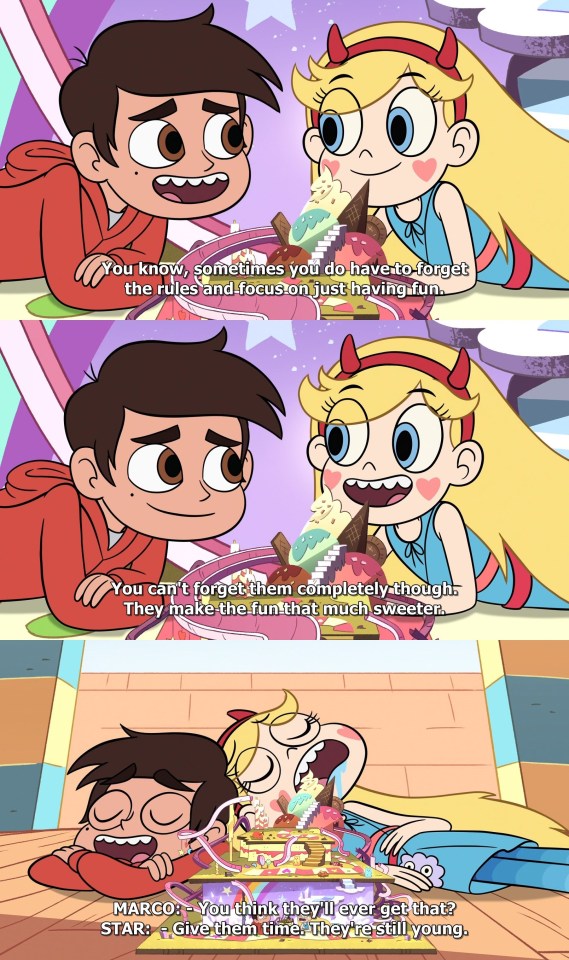
Bonus points for Star complimenting Marco for his skills with babies. DAD MATERIAL. ONE THOUSAND BABIES.

BY THE BOOK (2x07b)
This episode doesn’t really have any important Star - Marco interactions (even if it sure has cute ones, team work is the dream work. That’s how the saying goes, right?), but it reinforces the idea that Star learns things only in unconventional ways, something that often involves Marco during S2.
GAME OF FLAGS (2x08a)
Ignoring for a moment that Marco gets invited to what’s a family event, and that Star eagerly pairs up with him as Them Vs Her Families (ok I know that it makes full sense given the plot of the episode and it doesn’t mean there are any “Star and Marco as family” undertones here, but let me dream a bit ok?), the important stuff comes at the end: just like he did in Mewnipedence Day (albeit in a more direct way this time), Marco opens up Star’s eyes to the reality of the situation, snapping her out from a tradition she accepted without ever questioning it. And she doesn’t just back down, she tries to change things, she steals the flags, risking her own health, to claim the hill for all of them and change for good the nature of the event, just like she’s going to try and change Mewni. Once again the importance of Marco’s role in Star’s arc is evident, and once again he’s not a “teacher” who tells Star what to do, and even less a “savior” who has all the right answers for Mewni. He’s just a concerned friend who knows what kind of person Star really is, and who can give her a new perspective on things that helps her mature her own, personal, unique views. Views that are eventually going to forever change Mewni.
MEETING OF TWO INDIVIDUALS, MEETING OF TWO DIMENSIONS. The show begins with Star and Marco meeting it ends with their dimensions being cleaved together, they BOTH brought a new perspective on life to the other! It’s more apparent for Marco, since his advice pushed Star in a direction that has big effects on the plot itself, but Marco’s life was completely changed by Star as well, if in S3 he’s able to move to Mewni to have his “French Summer” and then in S4 he understands that importance of being true to what you want to commit to it’s only thanks to the crazy princess who helped him get out of his shell and make his first steps into real life. THIS is the very essence of what the show is, of Star and Marco being the tools to each other’s growth and happiness!
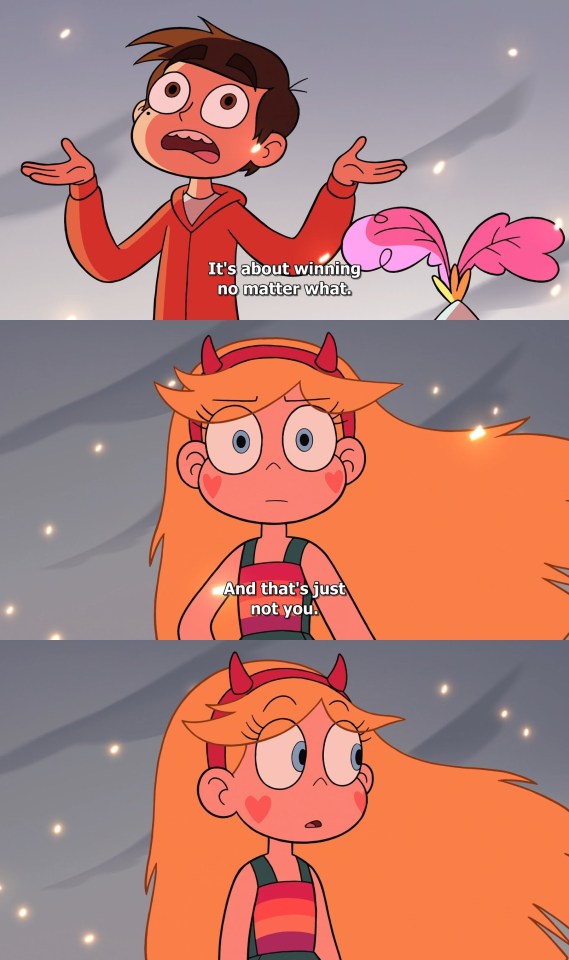
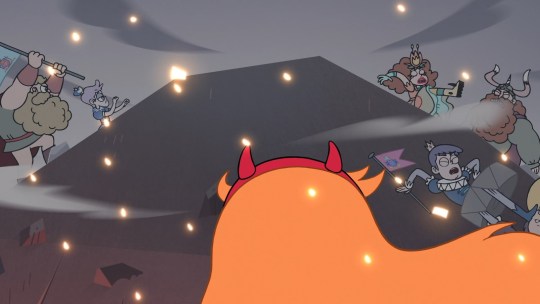
SLEEPOVER (2x09a)
One might expect a long section about this episode, but I’m going to keep it short: forget about all the “but how does the Cube work?” “who did lie?” and stuff like that. The important messages of the episode are crystal clear:
- Star Butterfly has a crush on Marco Diaz. No matter how conscious or unconscious it was at this point, the show told us directly, not just through undertones and themes anymore, that Star had specifically romantic feeling for Marco as well.
- Feelings are confusing. You Heart might feel like it wants something, but your Head doesn’t know that and it thinks you want something else. This is what the series bases everything related to relationships and romance on. This is why Star can be utterly convinced that she likes Oskar, at this point of the series, while actually having growing feelings for Marco. This is why Marco can move to Mewni, leaving Earth and his old life behind, while still not realizing the full extent of why he felt such a need to be with Star, and so on. The whole series plays with the idea that Star and Marco’s feelings for each other keep linearly growing throughout the show, but don’t always consciously influence their actions and thoughts in the same way.

And that’s why by the end of the episode the boarders can nudge our arms and go “Hey, hey, see that Star is sad when Marco ignores her because of Jackie? Hey, hey, that’s the seed of jealousy, that relates to love! Look at that!”, but then in Naysaya Star can be super happy for Marco scoring a date with Jackie. Dumb teens who don’t know what they want.
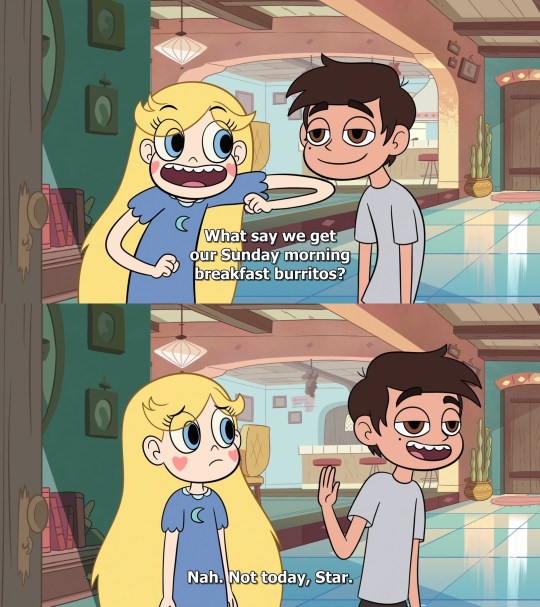
This line seemed so mature and deep at the little, little did we know the writers would have squeezed every last drop out of this concept as a way to justify things like Star and Marco completely ignoring their supposedly burning desire from Booth Buddies until Curse of the Blood Moon and then again until Mama Star. No, bad Seddm, no salt and negativity in these happy posts!
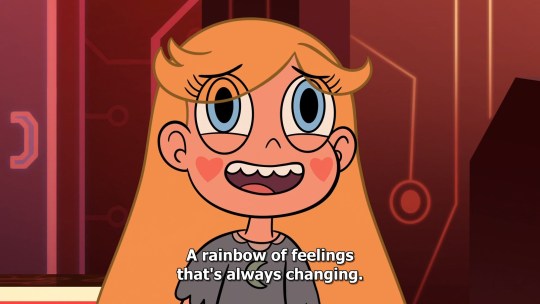
Let’s close this part here so that the core messages have more focus and remain more clear, but I wanted to point out that Star really loves involving Marco and having fun with him. Which is something we already knew but it always feels good pointing it out.

GIFT OF THE CARD (2x09b)
“Starco Teasing: The Episode”, also known as “How to have your main characters act like soulmates while still keeping everything in the episode frustratingly platonic only”.
From Star going [soft gasp] at how incredibly Marco looks in his ballet shoes
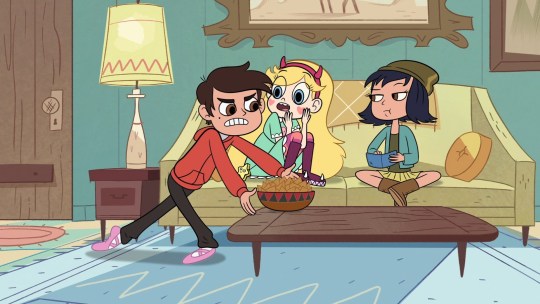
To the plot device of the episode being a gift for their anniversary... as friends, to everything else in the episode.
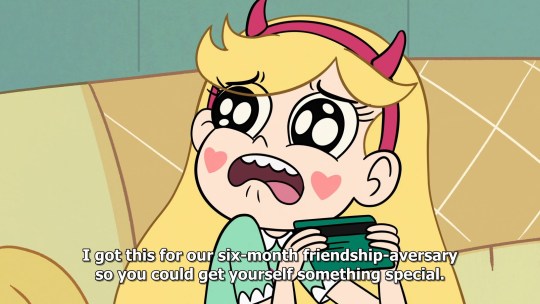
Ok this is clearly part of the gag but it’s also damn cute.

Star and Marco actually pour their hearts out with no recriminations here, and while it’s not something weird at all for this kind of scenes, where the characters think they’re going to die but the viewers are fully aware that it’s just the setup for a punchline, it’s still cute and a good example of the bases of their relationship.
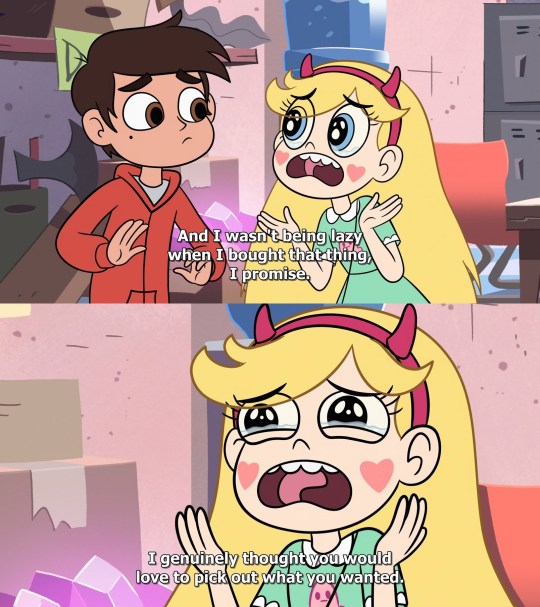
The fact that this scene is not played for laugh, and that Star genuinely appreciates Marco saying it instead of going “OH SO YOU WERE JUST TRYING TO SAVE YOUR BUTT”, goes in the big pile of “Why do I like Starco more than any other fictional relationship?” pile.
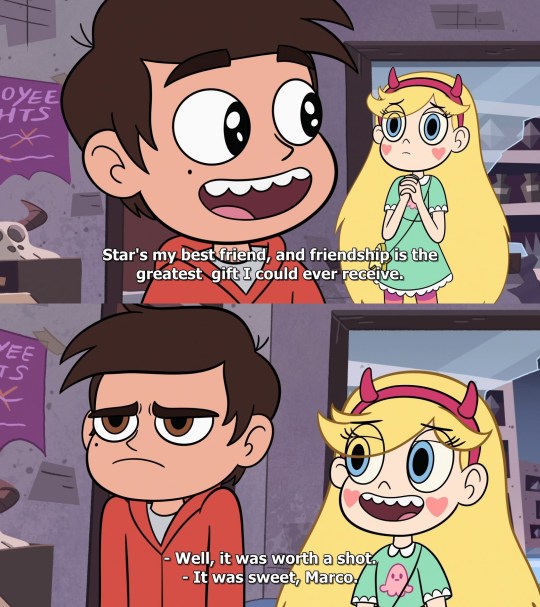
Never mind how horribly frustrating Marco’s “let’s die in each other arms so people will know that we were friends, yep, just friends, that’s the first thing everyone would think!” is: this is an alpha version of Cleaved, Star and Marco think that they’re going to die and that there’s nothing more they can do, and their reaction is to hug and hold hands, just wanting to be together in their last moment. The whole episode doesn’t really have high stakes and it’s clearly a silly, over the top adventure, but the emotions the dorks show are very real, and exemplifying of how in love (used in the broadest possible meaning, not with a strictly romantic connotation) they were already at this time.

And this is what Star decides to get excited about, not having survived. Again, a gag, but it still fits well, it’s not played for laughs with malicious intents or to mock their friendship.

PIZZA THING (2x12b)
Nothing major nor new since it’s something we saw as early as in the second segment of the series already, but Star has learned to enjoy a “calmer” way of having fun compared to what she was used to on Mewni, thanks to Marco’s presence, being more than happy to watch TV on the couch instead of going partying around, sometimes. Also the whole concept of “Friendship Thursdays” is adorable.
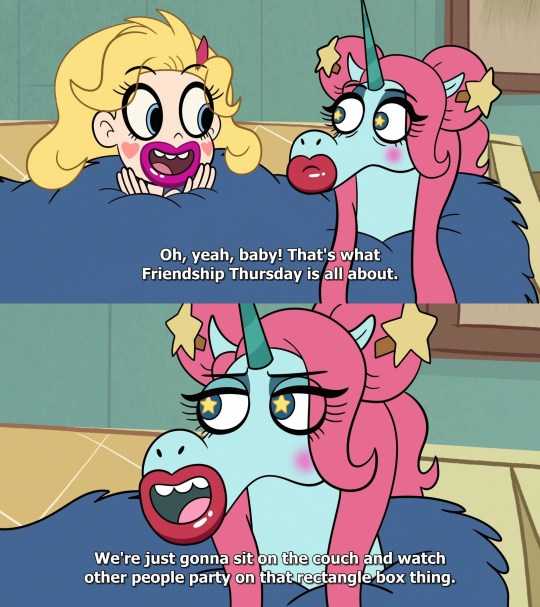
NAYSAYA (2x13b)
“How can Star be this eager to help Marco out with Jackie and cheer for him when in Sleepover she was s-” HEART AND MIND DISAGREEING SHE DOESN’T KNOW WHAT SHE WANTS she genuinely likes helping Marco and making him happy and won’t fully realize until Just Friends that this just means pushing him in the arms of someone who is not her, shut up!
With this out of the way, this episode features The scene showing just how much Star helps Marco getting out of his comfort zone, taking risks that go well beyond kicking monsters and going into other dimensions and becoming a better version of himself, one who can achieve his own happiness (Jackie is a small part of this, this concept of “achieving happiness” is going to be much more relevant in S4 and Star’s role in it for Marco - and viceversa - is literally going to be the main attraction during the series finale).

Hey look, Marco’s biggest fear is being alone (as in, feeling alone as an individual, without meaningful connections, not being literally alone) and without a goal and a meaning in his life. And for a time he’s going to delude himself in thinking that Jackie and school can be that, but then in Sophomore Slump he has to slowly accept and realize that Star is the only one who can give him that!
Wowie it’s almost like they deeply changed and influence each other’s lives.
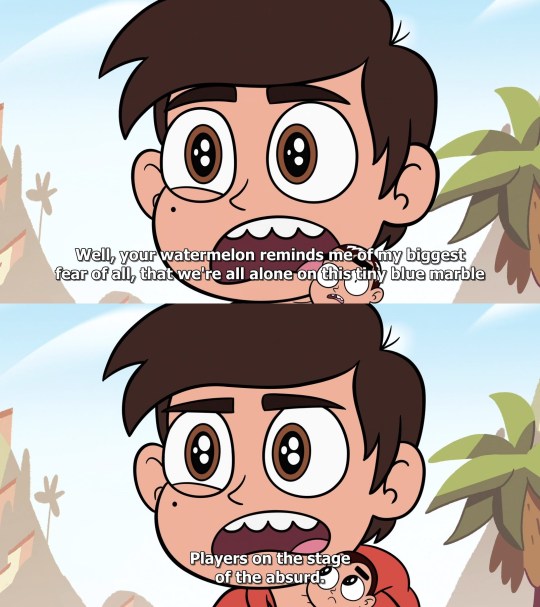
BONBON THE BIRTHDAY CLOWN (2x14)
I’m going to put this as a disclaimer at the beginning of this part so that I don’t have to explain later: during this episode Star clearly displays feelings and behaviors that can only be explained by having a crush on Marco and feeling an intense need to be with him. But the episode begins with Star cheering on Marco with Jackie, and is followed by several other episodes of Star being none the wiser about her feelings for it, and definitely not showing them. Why? How? Heart and Mind disagreeing; denial; being scared of change; blaming all her uneasiness from the night on having lost Glossaryck thus overwriting the other feelings until Just Friends; a combination of everything, you pick your poison.
This is a minor note, but both Star and Marco regret having forgotten about their already existing plan with the other for the prom, with Marco’s “Jackie High” lasting about half a second before he once again goes “Oh no Star, no hurt Star!”. It’s just a setup for the episode and doesn’t really play any role, but it’s a welcome breath of fresh air compared to the easy drama most shows from past decades would have immediately built up from this kind of situation.
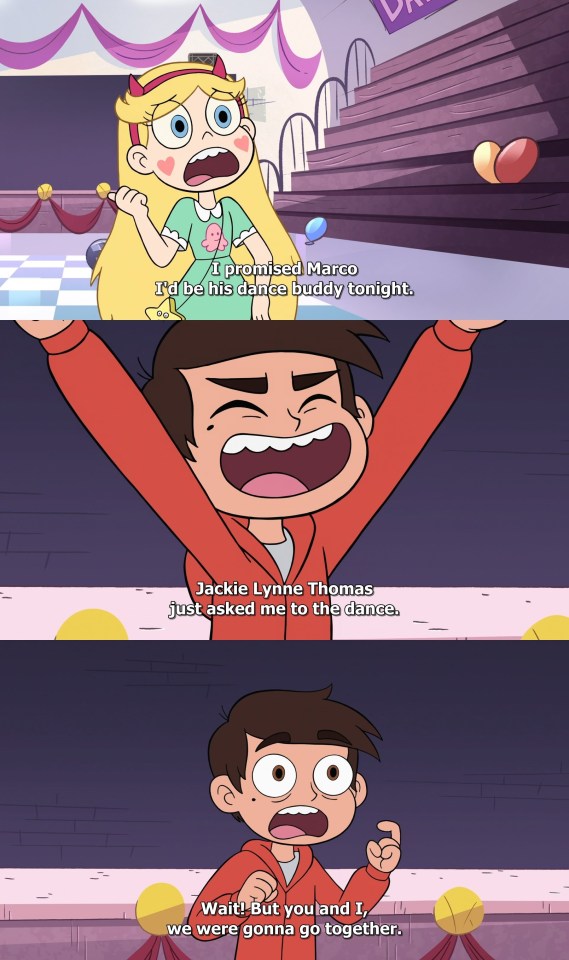
Star is super happy to greet Jackie, right now her mind still hasn’t put 2 and 2 together, she still hasn't processed “If Marco is going to a promo with Jackie as her date, he can’t possibly be romantically involved with me”. It’s all still a very unconscious process now (she won’t properly think “I want to smooch him but I can’t” until Just Friends), but it’s a painfully clear case of “You don’t know what you truly wanted until you lose it”, as evidenced extremely clearly both visually and by the subtle as a hammer on your teeth song (this scene here, Just Friends, Lava Lake Beach, song get used as a way to highlight and give exposition to the characters’ feelings multiple times in the early days of Starco).
Darned if I knew
That I'd find you
In the last place I thought you would be
What could I do
'Til I saw you waiting for me?
Ooh-ooh-ooh, ooh-ooh-ooh, ooh-ooh-ooh
And if I catch your eye
It feels like I could fly
Out from my lonely world into yours
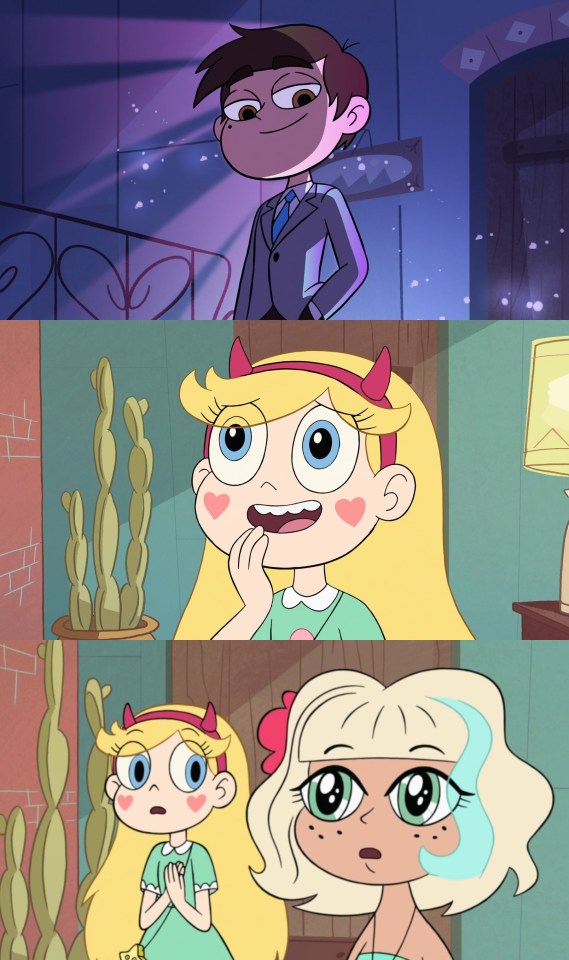
Following that, Star spends most of the episode feeling weird: she looks at the picture on her phone and feels bad and tries to find a reason for that, something to blame for the new feelings she’s experiencing.
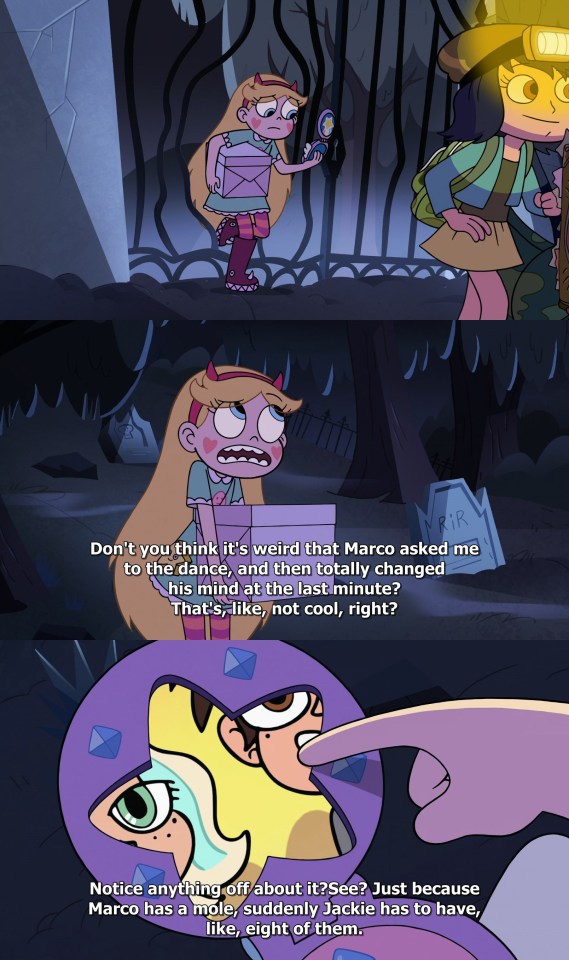

For a moment, when she uses the All Seeing Eye spell, she might have understood, or at least made a direct connection between Marco being on a date with Jackie, and her feeling like that. But the epiphany escapes her grasp after an instant, due to her magic going awry, and after that Ludo’s rat immediately gets there and she has other things to worry about.
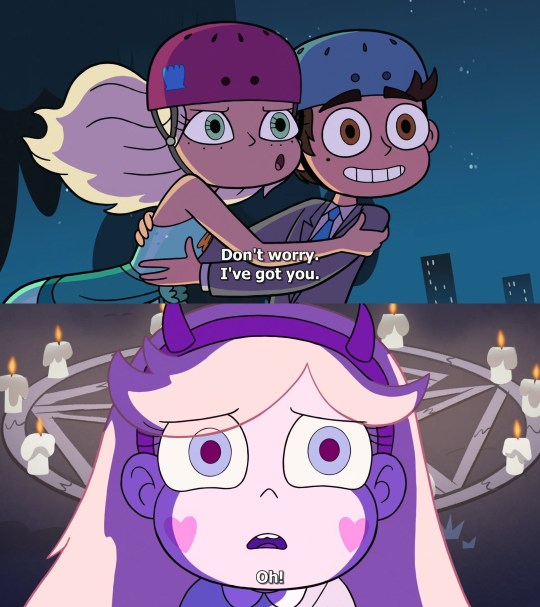
Going back to Marco’s side of things for a moment, a quick consideration about what’s clearly a Jarco moment, a moment of connection between the two of them: we get a character external to the Star-Marco dynamic acknowledging Marco’s tenacity and perseverance, a quality that early Star lacked (”looks like I’m just a skimmer”) and that’s going to become an important part of her later on (”I am a dipper”, never giving up with the Monsters and Eclipsa in S3 and S4). One of the most clear examples of how Marco’s good influence helped Star change for the better, and this is the first time he gets outright praised for it.

After the kiss Marco sees the Blood Moon, and he’s immediately reminded of Star and goes to check on his phone, noticing the missed calls and getting worried. Was this part of the curse? Was the Moon trying to hinder Jackie and Marco’s relationship? Absolutely fucking not, as Marco said the curse is bullshit and was never a thing. In the context of this specific episode it’s symbolic, nothing more: Star is always in Marco’s thoughts, we know it and no one can deny it, the Blood Moon was merely a visual way to remind him of her, and to tell us viewers that even while kissing his long time crush, Marco still keeps part of his being focused on Star. He could have seen a little girl playing with a magic wand or hear someone say “the stars are beautiful tonight!” and it would have had the same effect. There’s nothing magical here, and if there’s it’s not important; it’s not even a good thing for Star, since Marco and Jackie’s arrival at the graveyard is actually what makes Star lose control of her magic, losing the fight.
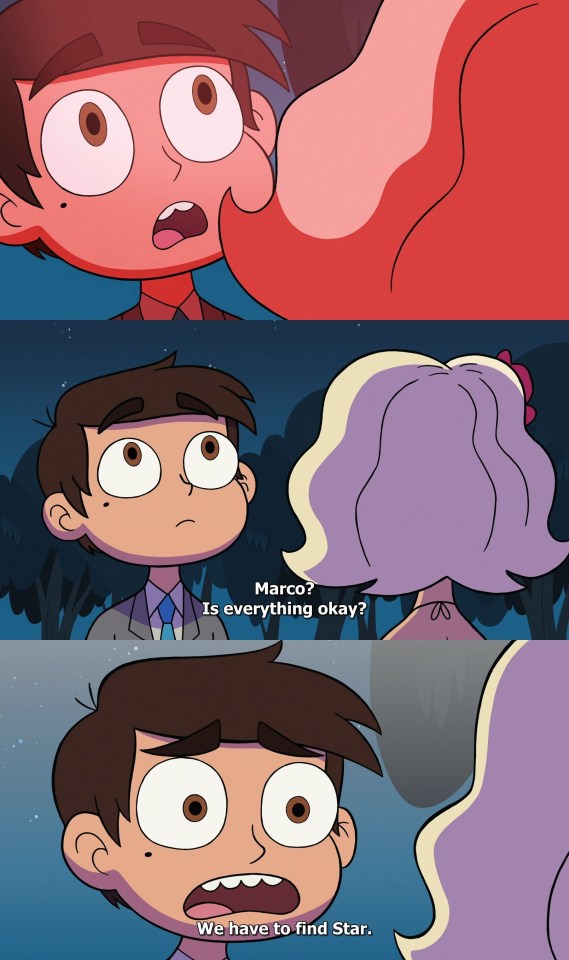
Marco saving Star is a cool and sweet scene, and sets a clear parallel with Wand to Wand (and we even have confirmation from the storyboarder that it was on purpose, not that it wasn’t clear enough already) that neither of them would ever let the other go, but there’s not much to be said about it, their commitment to each other is pretty straightforward and it’s obviously to be expected in dangerous situations such as this.
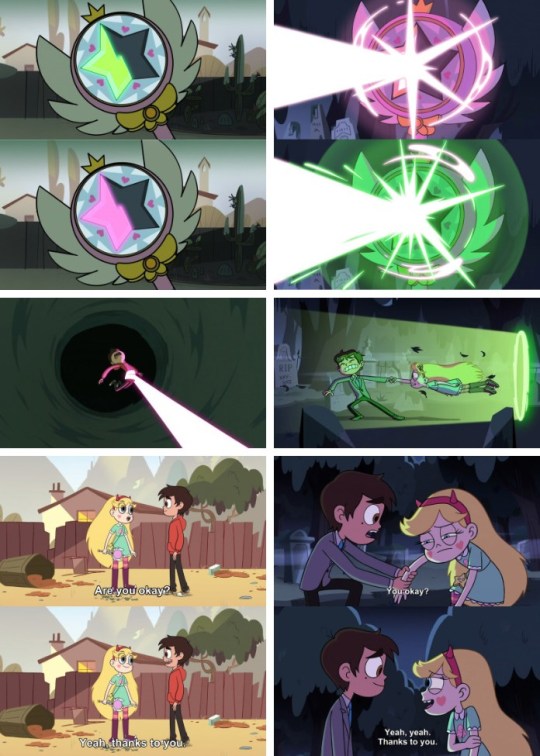
Also, it’s not a full parallel: in this case the moment of danger doesn’t end with a hug, but with Marco going to check on Jackie (after having helped Star up obviously, he’s still and will always be worried about her after all).

And yet, despite this, by the end of the episode Star entirely blames her sadness on having lost the book and Glossaryck. She’s still clearly hurting over Jackie and Marco, but the situation at hand gives her an easy way out, an excuse to latch on to “cover” her feelings for her bestie with a thick layer of “no no it’s definitely just this” (wow just like in Curse of the Blood Moon!). And thus the epiphany that she almost had while spying on them is delayed until Just Friends.

Neither Star nor Marco are clearly aware about it obviously, but it’s hard not to see that “I’ve lost Glossaryck” line as “I’ve lost you” as well. Fun times.
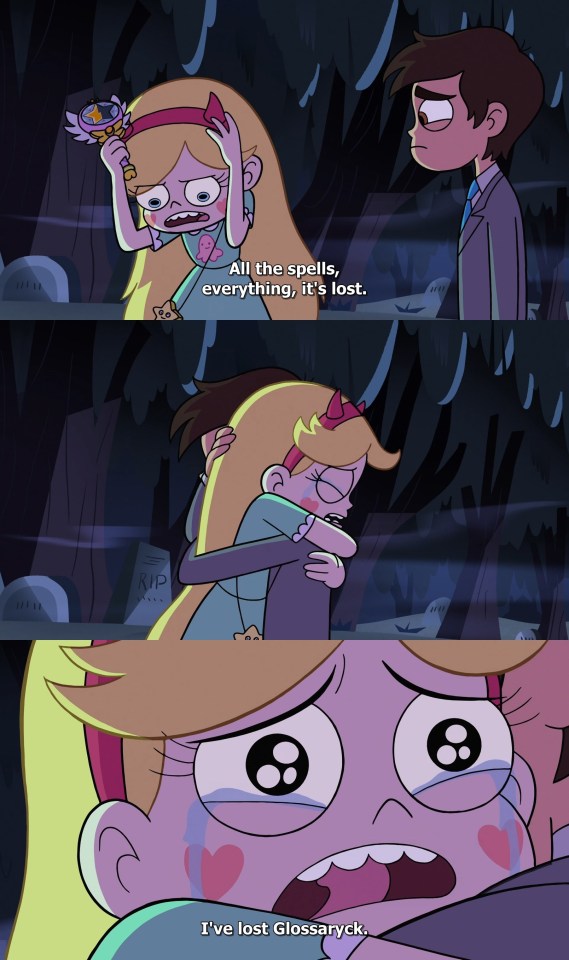
To conclude, going back to something from the middle of the episode (didn’t want to digress earlier): this scene with Glossaryck asking Star if he can burn a page from the book and Star telling him to do whatever he wants is another side to the “you don’t know what you wanted until you lose it”: Star barely cares about the Book, symbol of her duties as a princess, but in a handful of minutes - and for future episodes - she’s going to be terribly hurting over having lost it. As I said multiple times the arcs of “Star learning to stop running away from her problems and accepting her responsibilities” and “Star recognizing and accepting her feelings for Marco” go hand in hand, and are both integral to her development and character arc. And, as we are going to see in the season finale, neither of them can truly reach its payoff without the other.
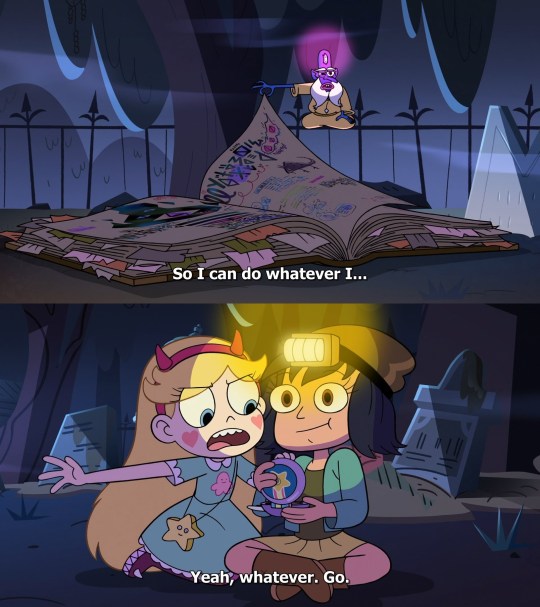
Bonus to make the whole episode a little less painful: while helping Star and Jackie up Marco might give Jackie more focus, but his tone of voice is way more kind and warm and delicate with Star, showing an incredible amount of care. Clearly this doesn’t entirely match Marco’s priorities in this moment, but it’s a welcome gift from Adam (and Daron I guess, since she’s always present during the recording sessions and certainly directed him to deliver the line in that specific way).
103 notes
·
View notes
Text
SnK S3E15 Poll Results (Anime Only Viewer Version)

The poll closed with 84 responses. Thank you to everyone who participated!
Please note this is the anime only viewer version of the poll. Manga readers, please click here for the results of the manga reader poll!
RATE THE EPISODE
65 Responses

This episode got overall positive responses from the fandom, with nearly all votes at a 4-5 rating. Can WIT keep up this momentum?
Another fantastic episode.
intense
Stressful
Rude
WHICH OF THE FOLLOWING WAS YOUR FAVORITE MOMENT?
64 Responses
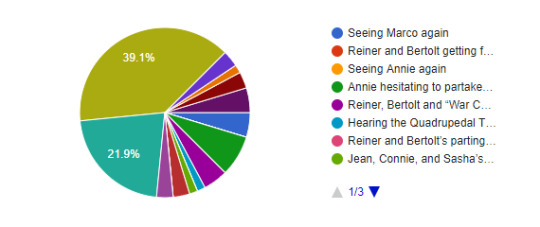
The favorite moment of the episode inarguably goes to Bertolt activating his Bertl Bomb™! Closely behind is the short Mikasa vs. Bertolt conflict, and in third place is Annie’s hesitance to assist in killing Marco.
Reiner was right, Bertholdt really was the strongest warrior of their so-called "hometown", able to fend himself off from an Ackermann.
Wow Bertholdt is really strong, he completely dominated Mikasa in their fight.
WHAT DO YOU THINK OF THE APETITAN AND YOUSEEBIGGIRL REARRANGES?
61 Responses

72% of respondents were thrilled to hear new versions of familiar songs from Sawano, feeling that the new versions were totally epic. Nearly 20% still prefer the originals, although they agree the new versions sounded cool.
WHAT’S YOUR OPINION ABOUT THE RECENT EARLY EPISODE LEAKS?
63 Responses

54% of respondents weren’t even aware that leaks of the episode had happened. 23% aren’t happy about the leaks happening, while 15% don’t really care.
Great. I hate sunday releases
WHO WON THE SHOUTING MATCH?
63 Responses
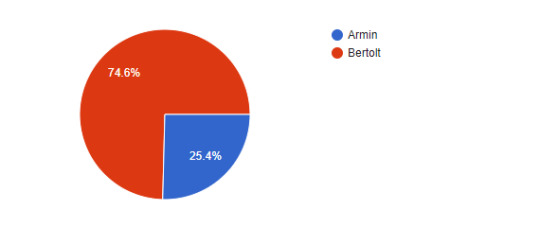
With nearly ¾ of the vote, Bertolt is deemed the winner of the shouting match on the rooftops!
Armin should have asked Bombholdt why they wanted to kill all humans.
HOW DID YOU FEEL ABOUT BERTOLT’S DEVELOPMENT AT THIS POINT?
64 Responses

40% of respondents are glad to see how far he’s developed as a character. 26% are just happy to have his thoughts and more lines from him, and narrowly behind at 25% people are curious to see what will become of his character.
He’s progressed but in the way of the warriors. The more he’s with beasty and Reiner the more cold hearted he becomes.
i still hate him with all my heart
Bertholdt with conviction is really badass. He’s actually interesting now.
HOW DID YOU FEEL ABOUT ARMIN BLUFFING ABOUT ANNIE A SECOND TIME?
64 Responses

A whopping 60% of respondents believe that Armin should have known better than to try manipulating Bertolt’s feelings for Annie to his benefit again, while the remaining 37% feel that it was worth another shot.
I think in Armin’s scenario he couldn’t think of another bluff that quickly so he resorted back to Annie, knowing that there was a chance it wouldn’t pay off.
WHAT DID YOU THINK ABOUT CGI COLOSSAL TITAN?
63 Responses
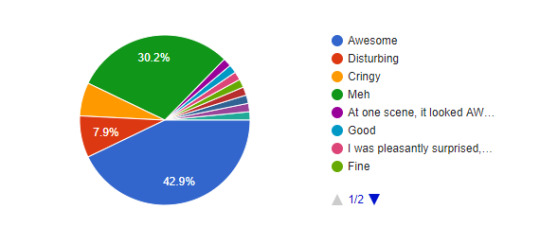
With a surprising divide between positive and negative reactions, 42% of viewers are pleased with the CGI render of the Colossal Titan, labeling it as “awesome.” Closely behind, 30% feel that it’s very “meh.”
WHAT DO YOU THINK ABOUT THE 104TH RIDING ON TITAN EREN?
64Responses

Fanart becomes a reality as the 104th take a ride on Eren’s titan form! 42% of viewers found this detail adorable, 29% think it’s pretty neat, and 20% don’t think much of it either way.
WHAT WAS YOUR REACTION WHEN IT WAS REVEALED THAT ALL OF THE WARRIOR TRIO WERE INVOLVED IN MARCO’S DEATH?
64 Responses
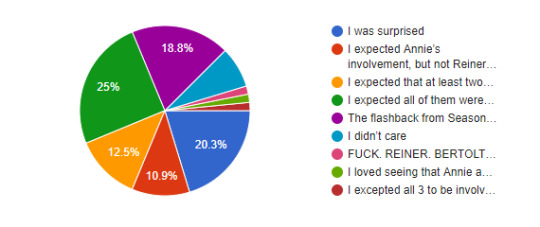
Much to the pollster’s delight, it seems that Reiner’s brief flashback from season 2 didn’t spoil it for everyone! A solid 25% of viewers had expected that each of them played a part in Marco’s death. 20% of viewers were genuinely surprised by the reveal. 18% picked up on the clue from season 2.
FUCK. REINER. BERTOLT. AND ANNIE.
I excepted all 3 to be involved but I DIDN’T expect them to care about killing Marco.
I loved seeing that Annie actually cared and didn’t want to take Marco’s ODM gear.
DO YOU THINK THE WARRIOR TRIO COULD HAVE NEGOTIATED WITH MARCO WITHOUT KILLING HIM?
63 Responses
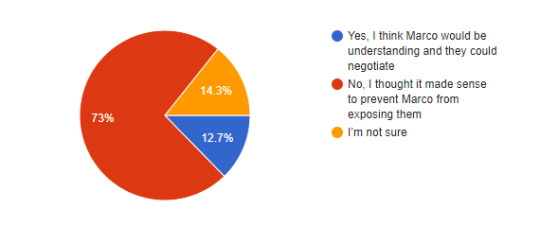
The overwhelming majority believe that Reiner and Bertolt were right to believe that negotiation with Marco wasn’t possible. 14% of respondents aren’t sure either way, and 12% feel they could have come to an understanding.
THE WARRIORS TALK ABOUT AN “EVIL RACE” AND JUST WANTING TO “END IT.” WHAT DO YOU MAKE OF THIS?
63 Responses
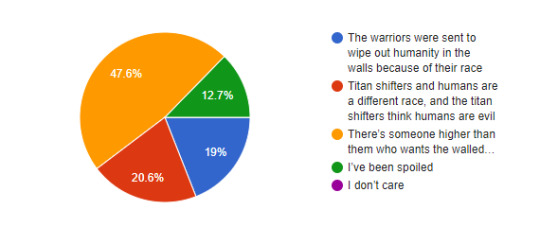
Nearly half of respondents believe that there’s someone above the warriors who wants humanity to perish. 20% believe that shifters are a different race than the rest of humanity in the walls, and 19% believe everyone in the walls are of a certain race, and that is why the warriors are trying to kill them. In retrospect, we should have left an option for write in answers. :P
WHAT DO YOU THINK THE SIGNIFICANCE OF REINER’S WORDS ABOUT HIS PROMISE TO YMIR ARE, IF ANY?
63 Responses
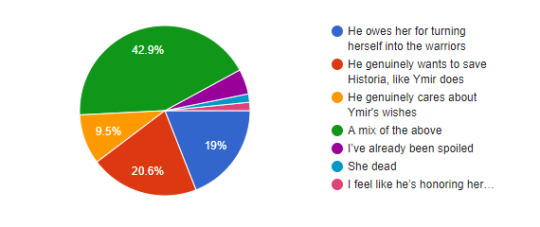
42% of respondents feel that Reiner’s desire to fulfill his promise to Ymir stem from mixed motivations. 20% believe that he genuinely just wants to save Historia, and 19% believe that he’s doing it as a way to repay her for saving them.
I feel like he’s honoring her last wish. (My theory is the Quadruped Titan night have eaten her)
REINER SURVIVED THE THUNDER SPEAR ATTACK BY TRANSFERRING HIS CONSCIOUSNESS AGAIN - THOUGHTS?
64 Responses

Over half of the fandom feel that Reiner’s abilities are simply born from plot armor. At much smaller percentages, 15% of respondents feel that it’s a reasonable explanation for his survival, 12% think it’s a super cool feature of his titan, and 10% aren’t really bothered about it.
Again, I think this is how shifting works. If your consciousness is transferred to your body then you transform, but if your mind and body are disconnected (by cutting off the nape) you die.
whatever, i just hate him with all my heart
WHAT IS THE FATE OF HANGE’S SQUAD?
63 Responses
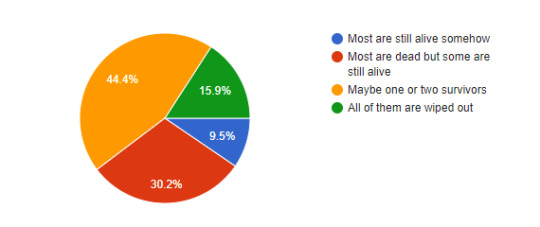
44% of respondents are certain that most of the soldiers with Hange were killed in the blast, with maybe a couple of survivors. 30% are slightly more optimistic about the survival numbers, but ultimately feel most of them didn’t escape the blast. 15% are certain that all of them have perished, and a small 9% are optimistic about their fates.
I hate that I have to wait until Sunday to see what happened to Hange’s squad.
DO YOU THINK THE 104TH WILL BE ABLE TO DEFEAT BERTOLT?
62 Responses
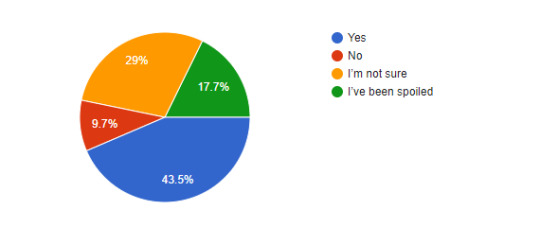
43% of respondents have faith that the 104th will be able to outdo Bertolt somehow and defeat him. 29% don’t want to say confidently either way, and 17% already know what happens.
HOW HAVE YOU OPINIONS ON THE FOLLOWING CHARACTERS CHANGED?


After this episode, Marco, Bertolt, Annie and Armin got large boost in regards to how well liked they are among respondents. Meanwhile, Reiner took the biggest hit, with more people finding him less favorable than more favorable, although most opinions remained unchanged. The Beast Titan, now known as Zeke, got a boost in terms of favorability. Mikasa remained mainly unchanged, but also received a good boost in favorability this episode.
BARREL BOY BEST (problematic) BOY
Jean and Mikasa are the only ones with resolve. Reiner and Bert are from the past
It feels like each character is acting realistically. They are on opposite sides of a war that they don't understand but were thrust into
ADDITIONAL THOUGHTS ON THE EPISODE?
It’s nice. Bertolt’s tranformation scene was really epic... but Hange squad might be dead... T.T
I think they could of done a better job in going into more depth about the plan? And i wish they didn't leave us hanging with what happened to Hange's squad
This may be a long one so buckle up. (im sorry)
Okay, so first off I didn’t know that quadrupedal titan could speak so that totally caught me off guard. Secondly, having seen the Lost Girls OVA, I expected Annie and at least someone else to be involved with Marco’s death. I feel really bad for Annie (and Bertolt, but mostly Annie) because it was obvious she didn’t want to kill Marco. Also Reiner’s split personality thing??? Anyways, I’m happy we finally got to see the beadt titan shifter, he kinda looks like Grisha though. The thing with Bert and Reiner was great. The Bert vs Armin yelling battle was great as well. I’m super excited for the next episode! This one was so good.
WHERE DO YOU PRIMARILY DISCUSS THE SERIES?
60 Responses
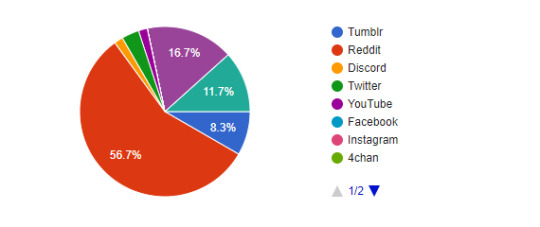
Thank you to everyone who participated! We’ll see you again in a few days!
13 notes
·
View notes
Text
Don’t Mind the Gap Transcript
Megan Figueroa: Hi, and welcome to the Vocal Fries Podcast, the podcast about linguistic discrimination.
Carrie Gillon: I'm Carrie Gillon.
Megan Figueroa: And I'm Megan Figueroa. And we have an exciting episode, today.
Carrie Gillon: Yeah.
Megan Figueroa: Yeah.
Carrie Gillon: It's really good.
Megan Figueroa: I know, I teased about it on Twitter, and [crosstalk] –
Carrie Gillon: [Laughs]
Megan Figueroa: – I'm so glad that it's finally coming out. It's, I think it's really good and it's really relevant.
Carrie Gillon: It's really relevant.
Megan Figueroa: Yeah.
Carrie Gillon: It's always relevant, but probably even more so right now.
Megan Figueroa: Yeah, yes.
Carrie Gillon: Yeah.
Megan Figueroa: Exactly. Before we get into the interview [laughs], there's so much shit happening in the world –
Carrie Gillon: It is true.
Megan Figueroa: Um –
Carrie Gillon: There's too much going on, really.
Megan Figueroa: Yeah, and, um, maybe it feels like some of these things aren't as important, but I like to think that the little space we've carved for ourself is making a difference, somehow. So, it is important that we talk about these things. I was thinking [laughs] about, um, you know, since the United States is on fire, right now, um –
Carrie Gillon: [Laughs]
Megan Figueroa: – and it's Supreme Court season, um – I don't know who it was that said it, but someone – I think it was a New York Times article – described Sonia Sotomayor's, um, dissent against the, uh, Muslim ban was "lashing out"?
Carrie Gillon: Yep, I think it was the New York Times. They've been bad about this kind stuff, recently.
Megan Figueroa: Yeah. And the problem with saying "lashing out," this would be problematic if it were just a woman, like, straight, like, a white woman, right? Because it's tone policing. But for it to be a Latina woman, there's the added element of the stereotype that Latinas are emotional or fiery.
Carrie Gillon: Yep.
Megan Figueroa: Right? So, um, yeah, of course, a lot of times, um, people say that women are hysterical or emotional anyway, um, but there's this, like, added layer of Latinas somehow being even more, um, fiery and ill-tempered or something like that. So, the, the choice of words was not great [laughs] –
Carrie Gillon: Yeah, I mean, I, I think they also said "passionate," which is also bad –
Megan Figueroa: Right.
Carrie Gillon: – but somehow not as bad as "lashing out."
Megan Figueroa: Right. Uh, it somehow – well, it's pejorative, right, I mean?
Carrie Gillon: "Lashing out" is pejorative, and "passionate" can be, but it doesn't necessarily have to be.
Megan Figueroa: Right.
Carrie Gillon: Like, you can be passionate about something in a way that is positive –
Megan Figueroa: Right.
Carrie Gillon: – or you can be passionate about something in a way that's, like, "Oh, calm down." Which is I think how that came across, and for good reason.
Megan Figueroa: Yeah.
Carrie Gillon: But "lashing out" really makes it obvious that it's pejorative. [Laughs]
Megan Figueroa: Yeah, and I feel like, even with "passionate," there is this double standard where, if we would've called Justice Kennedy passionate, somehow maybe more people would have cared and it would've been, like, "Well, if a man can get passionate about it, then this must be really important, or there must be a good reason for it."
Carrie Gillon: Right, it's like when Boehner would cry –
Megan Figueroa: Oh –
Carrie Gillon: – and that was, like, seen as a good thing.
Megan Figueroa: Yes.
Carrie Gillon: But if a woman had cried under the same circumstances, that would've been –
Megan Figueroa: Yes.
Carrie Gillon: – horrifying.
Megan Figueroa: Yes, exactly.
Carrie Gillon: No, I totally agree, I think "passionate" is bad, uh, bad enough, but in contrast [laughs], "lashing out" is just way worse.
Megan Figueroa: Yeah. I mean, there's no good reason to describe it that way, especially since the, the part, um, that they were pointing to was her reading the president's, uh, own words back at him, I believe, so it wasn't even her own words.
Carrie Gillon: And, you know, you should be allowed to lash out at words that are, have, are so full of animus.
Megan Figueroa: Yeah, and so, like, fuckin' racist [laughs] and Islamophobic.
Carrie Gillon: Yep.
Megan Figueroa: So, yeah, maybe we should be able to "lash out," quote-unquote.
Carrie Gillon: Yeah, there's been a lot of tone policing, recently, a lot of calls for civility –
Megan Figueroa: Yes.
Carrie Gillon: – in the face of horrific violence and, um, trauma. [Laughs]
Megan Figueroa: Right.
Carrie Gillon: Uh, just yesterday, um, there – well, uh, yesterday from when we're recording, so a few days ago for people listening, but – a newspaper office in Maryland was just shot up, and one of the survivors said "fuck" on TV about it, basically, "Fuck your, you know, thoughts and prayers. I want more." Um, and [laughs] Marco Rubio, among others, were, like, "Oh, why is it okay to say 'fuck' on TV, now?" Like, like that's the issue.
Megan Figueroa: Oh, I didn't – I knew that he tweeted that, like, he was so upset that the word "fuck" was being used, and I had no idea it was about that, specifically.
Carrie Gillon: Yep.
Megan Figueroa: Wow.
Carrie Gillon: Yep.
Megan Figueroa: Oh, my god. Yeah, yeah, as if that's, that's the real tragedy, here.
Carrie Gillon: Yeah. I mean, this has always been a problem in probably many societies since [laughs] time immemorial, but right now, it just feels like – maybe it's because everything's on fire. Like, everything is a dumpster fire, everything is the worst, and so, uh, if you don't wanna deal with that, if you wanna pretend it's not the case, the only thing that you can do is tone police.
Megan Figueroa: Yeah, it's true. And tone policing is, ultimately, gaslighting.
Carrie Gillon: It's like saying, "What you're feeling is not real," or it's not real enough. [Laughs]
Megan Figueroa: Exactly, exactly. And when it comes from people in positions of power –
Carrie Gillon: And it always does, right? I can't imagine –
Megan Figueroa: Yeah.
Carrie Gillon: – that you can really pull this shit if you're not in some kind of power position.
Megan Figueroa: Right. I mean, there are the trolls on the Internet, but usually they're – men. Or white.
Carrie Gillon: Right, and they might have less power than, say, you and, you or me –
Megan Figueroa: Right.
Carrie Gillon: – but there are still people that have less power than us that they're –
Megan Figueroa: Right.
Carrie Gillon: – wielding their power over –
Megan Figueroa: Right.
Carrie Gillon: – anyway. [Laughs]
Megan Figueroa: Yeah.
Carrie Gillon: [Sighs] Anyway, today's been a – I mean, this week has been rough.
Megan Figueroa: Yeah, and I, I say to it, uh, fuck civility. [Laughs]
Carrie Gillon: Yeah, me, too. I've never been one of those, like, "Civility's the most important thing."
Megan Figueroa: Yeah.
Carrie Gillon: I've, I've been more of a eh, time and place, but recently it's, like, well, now, there's no time and place for civility. Like, uh, this is an emergency.
Megan Figueroa: Or the, the time and place is to be uncivil. [Laughs]
Carrie Gillon: Yeah, yeah, I guess that's better, that's a better way of putting it.
Megan Figueroa: Yeah.
Carrie Gillon: Yeah, civility's not gonna get us anywhere.
Megan Figueroa: Yeah, it's the whole thing where, um, differing opinions can be respected, as long as you're not trying to, like, undermine someone's existence. And that's just happening all over the place, right now.
Carrie Gillon: Yeah, we're not fighting over, like – like, someone said, said on Twitter, basically, you know, we can fight over, like, levels of taxation, like –
Megan Figueroa: Right.
Carrie Gillon: – those are things that we can fight over and, and still respect each other about. But we can't fight over – yeah, like, women's right to exist, or people, people of color's, uh, right to exist, or – like, fill-in-the-blank [laughs] right to exist. We can't fight over that, like, this is – anyway. [Laughs]
Megan Figueroa: Yeah. Oh, well, sorry, all of our listeners that are in America, right now, the US – [Laughter]
Carrie Gillon: Or anywhere, really. Because unfortunately, whatever happens here is going to trickle out to other countries, in some way or other. I mean, look at the, all the trade wars.
Megan Figueroa: I know, I know, Canada's, what putting a lot of tariffs on US goods and such and blah and –
Carrie Gillon: Right. And that's gonna directly affect Canadians, because many of our products come from the United States, and so –
Megan Figueroa: Yeah.
Carrie Gillon: – the prices are gonna go up [sighs] –
Megan Figueroa: Is this, is this the new, uh, trickle-down economics? [Laughs]
Carrie Gillon: Yeah, kind of. [Laughs] Trickle-out anyway.
Megan Figueroa: Yep. [Laughter] Well, anyway, um, the world is terrible, but we have an excellent guest and an excellent episode for you, um, doing the interview. I left feeling great after, so.
Carrie Gillon: Yeah, that was a really good episode, I mean, really good interview, for sure, for sure.
Megan Figueroa: Oh, and one thing, before we get into it: Patreon. We released our June bonus Patreon episode that's usually just for our Patreon five-dollar-a-month, um, subscribers, so that you all could see what it's like. Um, so go check that out, and hopefully you'll be, like, "This is the shit that I need to get into." [Laughter]
Carrie Gillon: Yeah, hopefully you're, like, "Oh, yes, I enjoy just listening to them ramble on about random topics." [Laughter]
Megan Figueroa: Exactly. Exactly. [Laughter]
Carrie Gillon: Although, I think it was a good one, because it was really fun.
Megan Figueroa: Yeah. Yeah, so –
Carrie Gillon: So, yeah, if you wanna join us, uh, you can. The address is patreon.com/vocalfriespod.
Megan Figueroa: Yes.
Carrie Gillon: Yeah, so, uh, yeah, and then, I hope you enjoy this episode.
[Music playing]
Megan Figueroa: All right, so, today, we are lucky to be joined by Dr. Nelson Flores. Um, he is an associate professor – yay, just got tenure – in educational linguistics at the University of Pennsylvania graduate school of education. Uh, Dr. Flores has a Ph.D. in urban education, from the CUNY graduate school at the City University of New York. His research involves the study of the historical and contemporary instantiations of raciolinguistic ideologies, where language and race are co-constructed in ways that marginalize racialized communities. Nelson, thank you so much for joining us.
Dr. Nelson Flores: Thanks for having me.
Megan Figueroa: So, um, I mean, I've wanted to have you on, um, anyway, but it just so happens that you, uh, you are involved in a little bit of a controversy on Twitter. There's a thing happening, right now, with the so-called 30 million word gap. I thought that it would be great to talk to you about it. So, tell us, what, what is the 30 million word gap?
Dr. Nelson Flores: So, the 30 million word gap is an idea that emerged from a study that was published in 1995, that, essentially, makes the argument that low-income children hear 30 million fewer words than middle-class or upper-class children, within the first few years of life. The argument being that that so-called word gap is what is the primary culprit for their academic, um, challenges that they confront in school.
Megan Figueroa: Right. It was born out of this, the Meaningful Differences in the Everyday Experiences of Young Children, right, by Hart and Risley?
Dr. Nelson Flores: Correct.
Megan Figueroa: So, I had to read that book, and I was looking over it, when I was about to talk to you, and I just had to – I mean, this kinda gives you a feel, everyone. So, here's, here's one sentence that I, uh, highlighted [laughs]: "Quality interactions seem to come so naturally to the parents in well-functioning families, as to suggest that a certain amount of quality interaction may be essential to basic language competence." So, it's filled with these things, and I don't know, I mean, for you, Nelson, I, I'm imagining, too, there's, like, a visceral reaction to, to hearing something like that [crosstalk]?
Dr. Nelson Flores: Yes, yes –
Megan Figueroa: Yeah.
Dr. Nelson Flores: – there is. I mean, let's even begin by unpacking what the term "quality" even means.
Megan Figueroa: Right.
Dr. Nelson Flores: Um, it's a very arbitrary term that is concerning – that researchers are using in some type of kind of way that seems like it's objective. Quality is in the eye of the beholder, right? What's quality to one person may not be quality to the other. And what Hart and Risley and many people who propose the word gap do is that, they take practices that have typically been associated with middle-class, upper-middle-class affluent white populations, and, surprise, surprise, they decide that those are quality. Um, which, of course, is not an objective statement, um, and, one could argue, is actually a racist statement, to claim that a particular cultural background is higher-quality than the other.
And to be clear, I'm not suggesting that white middle-class and upper-class people don't have a rich cultural practices that they engage in. The issue is that all communities have rich cultural and linguistic practices that they engage in, and that's something that the word gap discourse completely ignores. It completely ignores decades of anthropological research that documents the rich cultural and linguistic practices of all communities, and supposes that the practices of one is somehow objectively more quality than others.
Megan Figueroa: How, then, does this get reinforced? Because I know it's in the mainstream consciousness right now, and we'll talk about that in a second, but how has it been reinforced for so many years? For decades.
Dr. Nelson Flores: Well, because it is part of a much longer history where the language practices of racialized communities, of low-income communities, have always been framed through a deficit lens. Now, if we even go back to the early years of European colonialism, we can see raciolinguistic ideologies being used to dehumanize indigenous communities. Where people would describe the language practices of indigenous peoples as, um, almost animalistic, as a form of dehumanization. Now, nowadays, people wouldn't say things like, "People are speaking like animals," or at least most people wouldn't say that. Um, but the underlying logic of there's something somehow deficient about the language practices of racialized communities has remained consistent since the early days of European colonialism. And so, it's not surprising that the 30 million word gap is so seductive, because it reinforces all of these ideologies that people have been socialized into accepting, for multiple generations.
Megan Figueroa: Right. And you give an example of this in one of your, um, blog posts, um, or at least an analogy as to, to the war on poverty, um, or the war on drugs, that these are kind of the things that we grew up with believing, that are built on a foundation of racism. Um, but that are trying to be solving some bigger problem, but really, we're not addressing the true problem.
Dr. Nelson Flores: Right, and, I mean, and you can trace these discourses, they're consistent throughout history, of putting the onus on racialized communities to undo their own oppression by modifying their behaviors, rather than undoing the structures that actually are the primary challenges that they confront.
Megan Figueroa: Why, why is it in the con – so, it's this new article that was published, I believe April 2018 article? – very recently – by Sperry et al. And, so, they are refuting Hart and Risley's claim, and people aren't happy. So, they refute it by saying that there's incredible variation in the vocabulary environments in different socioeconomic status homes. What Hart and Risley failed to do was to look at sort of a larger picture of the vocabulary that children are getting, is that right?
Dr. Nelson Flores: Right. So, they, essentially, made the claim that they, uh, replicated the Hart and Risley study, and found that the differences were really just as big within the social class as between them. Uh, because we have to remember, the Hart and Risley sample was a fairly small sample, right? They, they –
Carrie Gillon: Yeah.
Dr. Nelson Flores: – based their arguments on a sample of six, um –
Megan Figueroa: Families, six families, right.
Dr. Nelson Flores: – six families, that were called, I think, "welfare families," in the actual book, and have made these broad claims based on six families. Um –
Megan Figueroa: Right.
Dr. Nelson Flores: – which is questionable in and of itself, right?
Carrie Gillon: [Laughs] Yeah, that's, that's – I can't even believe they got away with that, but.
Dr. Nelson Flores: Um, and, uh –
Megan Figueroa: Yeah.
Dr. Nelson Flores: And again, I think it's because it's something that people already believe, so people say, "Oh, yeah, of course it's true, because it must be true, because we've been taught that it's true." Um, and so, what this new study did was do something similar, and find that there actually weren't these hugs differences across social class groups. And immediately, um, there were critiques about the methodology. And I think some of the critiques about the methodology are fair, because no methodology is perfect, right?
Megan Figueroa: Yeah, exactly.
Dr. Nelson Flores: We always are making decisions about the research we do, and there's always issues with the decisions that we make. But what I found interesting was the fact that people who were critiquing this new study for its methodological – for its supposed methodological flaws, um, were uncritically citing the Hart and Risley study, which has been critiqued over and over again. So it feels a big disingenuous to –
Carrie Gillon: Yeah.
Dr. Nelson Flores: – point to the methodological faults of the new study – which some of them, again, may be fair – without acknowledging that the study that they're citing as the foundation of their work also has extremely questionable methods that they use. And are making conclusions that really aren't necessarily reflected even in the data that they have.
Carrie Gillon: Right.
Megan Figueroa: One of the big things that Spiri et al points out, and you've talked about, um, is that you're ignoring a lot of the cultural interactions that happen that you can't just look at by asking the, the parents or the immediate caretakers, "What words does your child know?"
Dr. Nelson Flores: Right. Right, like, language is not just a series of decontextualized vocabulary words. And more isn't always necessarily better.
Megan Figueroa: Right.
Dr. Nelson Flores: There are lots of social practices that we engage in, where being concise and using fewer words is actually seen as better than using more words, right?
Megan Figueroa: Mm-hmm.
Dr. Nelson Flores: So, even the idea that more is inherently better isn't –
Megan Figueroa: Right.
Dr. Nelson Flores: – universal and isn't necessarily true. But of course, we actually use language to engage in social practices with other people. So we're not just listing vocabulary words [laughs] when we're talking to other people. We're engaging in dynamics that we've been socialized into, that we've gradually become familiar with as we become more socialized into those practices. Um, and so, to decontextualize language in that way, I think, really shows a fundamental misunderstanding of what the function of language is, which is to communicate, which is to engage in practice. It's not to memorize vocabulary lists.
Now, schools may like people to memorize vocabulary lists, um, but that's a different argument, right? If, if what you're saying is that these are the types of decontextualized language practices that they're expected to be successful with in school, then that's a different conversation. Because then I would argue, well, why are we using these decontextualized language practices in school, when we know that in the real-world that's not how people actually use language. Maybe the problem isn't that these particular students haven't mastered a particular list of decontextualized vocabulary words. But rather, the fact that schools have decontextualized language from the practices in which they're engaged in. Um, and I think that may be part of, um – that would be a more interesting conversation, for me, than to look at these decontextualized vocabulary words.
Carrie Gillon: Right. I have a question about the original studies. So – or, actually, both, both studies together. They do have different methodology, even though one is sort of based on the other. Can you explain what the differences are? Because I think that's really what people were fighting about, right?
Dr. Nelson Flores: So, I think that the, the biggest concern that people have raised about the newer study was that it doesn't include, um, a class of professionals. Um, so it includes, like, lower-class and middle-class, but doesn't include the professional-class that was in the original Hart and Risley study. And so, in that sense, it's not an actual complete replication, um, although, I don't think –
Carrie Gillon: That's true.
Dr. Nelson Flores: – that necessarily discounts the findings, though, that, when we're looking across social classes, there aren't these stark differences that the original study had indicated. Um –
Carrie Gillon: Right.
Dr. Nelson Flores: And so, I don't think that we can determine, one way or the other, whether there are these huge differences. We have one study that suggests that there are, we have another study that suggests that there aren't. My issue is that I don't even think that that's the right question to be asking. Um, the, I don't think the right question is to ask, "How many words are children being – hearing at, at home?" Um, because as I, um, was just saying, that's not actually what language is, right? Language isn't –
Carrie Gillon: Right.
Dr. Nelson Flores: – the number of words we hear, it's the practice that we're – practices that we're being socialized into. And in order to understand those practices, we really need more rigorous ethnographic work, right? Like, it's not something –
Megan Figueroa: Yes.
Dr. Nelson Flores: – that can be done just by counting words. We actually need to observe and document the practices where those words are imbedded in. And anthropology has shown us, for decades, that regardless of how many words people may or may not be hearing, um, that they're being socialized into complex practices.
Carrie Gillon: Yes, I think that was actually what I was trying to get at is this, because I think one of the differences is, um, the, the first study was all about child-directed speech only, if I'm remembering correctly, and the second study includes all speech spoken around children.
Dr. Nelson Flores: Right.
Megan Figueroa: Yes.
Carrie Gillon: And that's important.
Megan Figueroa: It is, and I'm thinking, 'cause, like, reading Hart and Risley, it doesn't even – the, the way that they talk about what language, like, what language is, it doesn't even look like what my childhood was like. And I'm, like, if you're just focusing on parents, you're not looking at the fact that my tio came over, like, two days a week, and that I would spend so much time with, at my grandma's house, and I always had cousins running around. What about all those interactions that are happening? And that's what you're saying, we can't not look at context and how, um, how language works in those contexts.
Dr. Nelson Flores: Right. And I think something else that is methodologically questionable in Hart and Risley – and again, this isn't a critique, per se, but more just, like, a challenge of methodology – is that when you bring a recorder in to homes, that can impact the dynamics, too.
Megan Figueroa: Yeah.
Carrie Gillon: Yeah, absolutely.
Dr. Nelson Flores: Right, where, like, if you're, uh, one that they're calling a welfare family –
Megan Figueroa: Right.
Dr. Nelson Flores: – and you have people in your home recording, that might have different connotations to you, um, than if you're a professional who maybe wants to show off to the researcher.
Megan Figueroa: Yeah.
Dr. Nelson Flores: Right?
Megan Figueroa: Exactly.
Dr. Nelson Flores: And so, [laughs] we don't know –
Megan Figueroa: Good point.
Dr. Nelson Flores: – exactly how to kind of make sense of that, but I do think it's a methodological issue that really needs to be considered.
Megan Figueroa: Yeah, for – you could have people who actually look like the people that you're studying being the recorders, at least that might help a little, right? I still think about how, like, we always dodged, like, we always hid when someone knocked on the door. [Laughs]
Dr. Nelson Flores: Right, exactly.
Carrie Gillon: I'm, like, I don't even think they're gonna, like, let anyone into our house to do that. [Laughs]
Megan Figueroa: Yeah, uh, even, even coming from a middle-class family, I can't imagine participating in that as a child. It would've terrified me. [Laughs]
Carrie Gillon: Yeah, oh, yeah, yeah, me as a child, too, thinking about, like, how we – our individual characteristics of children, I would've been, like, "No, stranger, I'm not gonna talk," like, I'll – I probably would talk less, so.
Dr. Nelson Flores: Right, right, but I could imagine a professional parent knowing what the right thing to do is –
Megan Figueroa: Yeah.
Carrie Gillon: Mm-hmm.
Dr. Nelson Flores: – um, and knowing that the recorder is on, doing the things that they know are the right things to do, 'cause maybe they read it somewhere, right?
Megan Figueroa: Yeah.
Dr. Nelson Flores: And maybe that's not always what they do, maybe they actually aren't talking to their kids all the time, um –
Carrie Gillon: Yeah.
Dr. Nelson Flores: – maybe sometimes the kids are watching TV. Um –
Carrie Gillon: Yeah.
Megan Figueroa: [Laughs]
Dr. Nelson Flores: – but they know when –
Megan Figueroa: Yes.
Dr. Nelson Flores: – the recorder is on, that they shouldn't be watching TV, right?
Megan Figueroa: Yeah.
Carrie Gillon: Exactly.
Megan Figueroa: Yeah, and not, they'll not use as many directives. That seems so – I hated that, when I was reading it, the whole directives thing just felt – I don't know, I couldn't really, like, point out how or why it offended me so much. Maybe 'cause my parents used a lot of directives? [Laughs]
Carrie Gillon: Can you explain directives?
Megan Figueroa: Oh, yeah. So, like, saying, uh, a directive would be, like, "Clean your room," instead of saying, "Well, um, it looks like your room's a little messy. What do you think you should do about that?" Like, that's what they want [laughs] people to say.
Carrie Gillon: They want people to be more passive-aggressive?
Dr. Nelson Flores: Yes, they think that that's quality.
Megan Figueroa: Yeah, basically, yeah. [Laughter] Right. And I'm, like – [Laughter]
Carrie Gillon: No, as a Canadian, I'm just gonna say, no. [Laughter] Less is better on that front. [Laughter]
Dr. Nelson Flores: But, of course, that, that reminds me of the work of Lisa Delpit, right, who, um, kind of looked at the cultural differences in parental communication, and found, in her work with African American parents, that they were more directive, um, than in white middle-class families. And then, what happens when those children get to school is that, the teachers who have been socialized – because most of the teachers are white women, by demographics – they've been socialized into this more passive way of making requests, where they'll say, "Don't you think you should be doing this?" The child, the child may not actually understand that that actually was a directive, right? Because it was a directive [crosstalk] –
Megan Figueroa: Yeah.
Dr. Nelson Flores: – the teacher was making a request, and the child didn't necessarily understand it was a request, and maybe actually thought that they had a choice when you said, "Don't you think you should – "
Which gets, again, to the importance of understanding cultural difference, and not assuming that one is more quality than the other. I mean, Lisa Delpit makes it very clear, in her work, that it's not that black parents care less about their children. They love their children, they are – they have a particular history, um, where maybe there are needs to be more directive. Because if not, um, their child isn't gonna be socialized to deal with an antiblack world, um [laughs] –
Megan Figueroa: Exactly.
Dr. Nelson Flores: – that expects people to – uh, uh, expects black people, in particular, to adhere to directives, right?
Carrie Gillon: Exactly.
Megan Figueroa: I mean, I guess that's what it, it really was when I was reading and kept hearing about directives and them basically shitting on directives, I'm, like, "Oh, it just, it feels dripped – uh, like racism is dripping off of this." And, uh, they may have not – again, I think, uh, Carrie said it, once about sexism, called, called it "benevolent sexism" –
Carrie Gillon: I, I did not make up that term. [Laughs]
Megan Figueroa: Well, I know, I know, she, uh, that's where I – the first time I heard it was you saying it on something. But is this, like, benevolent classism and racism, you think?
Dr. Nelson Flores: I mean –
Carrie Gillon: I don't know – I don't know if it's benevolent.
Dr. Nelson Flores: I don't know, I mean, I actually am one who's not particular interested in what one's intentions are. Um, and so, it's, like, I'm sure they had good intentions, I mean, I don't think people do research with – or, or at least social science research, without wanting to make a difference and help. But it doesn't really matter, in the grand scheme of things [laughs] –
Megan Figueroa: You're right.
Dr. Nelson Flores: – if you can, you're still producing, um, racism. And, and I think that, um, like, even terms like "covert racism," oftentimes, I find problematic, because who are they covert to? Um, like, oftentimes, the victim of it –
Carrie Gillon: Other white people. [Laughs]
Megan Figueroa: Right.
Dr. Nelson Flores: – is, is quite conscious of it and it's not covert.
Megan Figueroa: Yeah, yeah.
Dr. Nelson Flores: Um, it's only covert to the one who isn't aware that they're being racist, right? Um, and so, and so, I think that for me it's, like, less important what their intentions are, and more about, I think that the framework that they're using is fundamentally flaws, and has led to interventions that are quite damaging. Um, and I know that that sounds maybe extreme, in some ways, but I do think that interventions that are coming from a racist deficit perspective are damaging to children.
Megan Figueroa: Right, so let's talk about impact, 'cause, uh, one of the impacts – this is a big impact – at University of Chicago, there is a 30 million word center for early learning and public health. And they get tons of money – tons of money.
Dr. Nelson Flores: [Crosstalk]
Megan Figueroa: You go to their website [laughs] and there's a donate button, but you know they're getting government money and grants and stuff.
Dr. Nelson Flores: Mm-hmm.
Megan Figueroa: Um, uh, and it's, I mean, I don't mean to shit on [laughs] the director, um – anyone who goes to the website and looks at the videos, it's – it feels gross. You see, like, white people telling black parents, like, what to do with their children, and it feels terrible. That's a huge thing that's getting tons of money, because of the 30 million word – the so-called 30 million word gap from Hart and Risley. Like, that's an, that's a direct impact of that study.
Dr. Nelson Flores: Right, right.
Megan Figueroa: It's named after it. [Laughs]
Carrie Gillon: And what, uh, what's happening to these kids, like, what are they provided with in these, in this program?
Megan Figueroa: "Intervention," quote-unquote, intervention, based on, "Let's, uh, let's not have the directives. Let's, let's, um, open it up so there's more questions, so children can answer back," like, this kind of thing.
Carrie Gillon: I see, yeah.
Megan Figueroa: So, they are trying to change the way that children interact – or, sorry – that, uh, caregivers interact with their children, and that's just inherently icky, to me.
Dr. Nelson Flores: Right. Well, I think that all of the money going into it might give you some indication for why people were so defensive about –
Megan Figueroa: Right, yep.
Dr. Nelson Flores: – a response that called it into question, because there is a lot of money that's going into it. I mean, remedial compensatory education, which has been funded by government and nongovernment officials since at least the '60s, um, that are designed to fix the so-called cultural and linguistic deficits of racialized communities, have always been, um, a very lucrative industry. Um, there's always been tons of money going into it. I mean, I don't even know how much money – probably billions of dollars, at this point, honestly. And I always wonder, like, what would the world look like if we actually, like, invested that money in revitalizing communities, and, like –
Megan Figueroa: Right.
Dr. Nelson Flores: – ending poverty, and, like, ensuring that children had access to quality healthcare.
Megan Figueroa: Or even just textbooks.
Carrie Gillon: Yeah.
Megan Figueroa: Like, like, simple educational, uh, funding.
Dr. Nelson Flores: Right, right. Um, I think our society finds fixing racialized communities as a seductive narrative.
Megan Figueroa: Yeah, definitely.
Carrie Gillon: Yeah, I agree.
Dr. Nelson Flores: Because it really leaves the rest of the society off the hook, right? So, we don't have to reflect on the root causes of racial inequalities, because we can just say, "Oh, it's their fault, because they're not using – they're not asking their children questions." I don't know how anyone who, who has any experience working in neighborhoods, um, that have experienced multiple generations of racialized poverty, um, could possibly think that changing the way that you ask questions to your child, or increasing the number of words [laughter] that you give them, is really going to be what's the make-it or break-it for –
Carrie Gillon: Yeah.
Dr. Nelson Flores: – whether that child is gonna thrive or not, right?
Carrie Gillon: Right.
Dr. Nelson Flores: It's, like, these are children who sometimes struggle with homelessness, right, these are children who have food insecurity. In Philadelphia, led poisoning has been a huge issue, and that's – I know it's in other places, as well, like Flint, right?
Carrie Gillon: Right.
Megan Figueroa: Yeah.
Dr. Nelson Flores: All of these structural issues –
Carrie Gillon: Yeah.
Dr. Nelson Flores: – that are much more salient in the lives of these childrens and these, and these family, right? Um, but in education circles, we tend to think that none of that has anything to do with, like, what we should be talking about, right? We should just be talking about fixing the kids. Um, and I think that's, that, one, it's misguided, because of all of these other challenges that I, I think are much more salient. But, two, it then socializes teachers to come from the perspective that the kids are broken and need to be fixed, right? And that is not a productive perspective to begin with, especially when we look at the demographics of teachers versus students, when there's already this divide between them, right, the last thing that we wanna do is increase that by teach, telling teachers that their job is to be like these people in that website that you were talking about, um, these benevolent white people who are trying to fix racialized communities.
Megan Figueroa: Yeah.
Dr. Nelson Flores: Right, that's not a productive stance, it's never worked in the past, um, and it's not going to work now.
Megan Figueroa: It's, uh, it is a seductive line of thinking, for a lot of people, because it's kids. So, like, a lot of people are, like, "This is seductive because, oh, if I support it, I can – I'm helping the children." You motherfuckers [laughs], help, help kids in other ways. Sorry, we do have an explicit rating.
Carrie Gillon: This also reminds me of work on, um, Inuit children in, in Quebec. So, uh, when they go to school, like, obviously, the schools are mostly – or at least at, back when this research was done – mostly white people. And so, they grow up in, in the Inuit communities where they – there's not a lot of child-directed speech. Um, and so, well, and then, they get into the classroom, and suddenly this adult is talking to them, and they're not used to it, and they don't know how to respond at all. Yeah, so, the, the different communities do different things, and we never – we just assume [laughs] white is the norm, white North American is the norm, and everyone should behave like us, and – it's really fucked up.
Dr. Nelson Flores: Right. Well, and the thing is is that, if Hart and Risley said that, and the people who support –
Carrie Gillon: Yeah.
Dr. Nelson Flores: – the 30 million word gap said that, at least I would respect that they were coming from a position of authenticity, right?
Carrie Gillon: It's true.
Dr. Nelson Flores: Um, but the fact –
Carrie Gillon: It's true.
Dr. Nelson Flores: – that they tried to frame it as objective, I think, is what makes it even more insidious, right? It's, like, no, there's no objective basis for determining that being nondirective is more quality, right? That, that, that's not an objective statement. That's coming from a particular ideological position. So, if you can own that position, if you can say, "Yes, I think that all racialized community should behave just like white people," I would disagree with you, but at least I would say, "Well, you're being honest with what your perspective is, and you're not hiding it behind –
Megan Figueroa: Yes, yes.
Dr. Nelson Flores: – "this veil of objectivity."
Carrie Gillon: It would be more honest – I just translated it for people.
Dr. Nelson Flores: It's a, it's a, it's a more quality interpretation than theirs.
Carrie Gillon: [Laughs]
Megan Figueroa: But you're right, I, I have the exact same objection: just say what you're actually saying. People, people like to be really sneaky. They, I mean, they might even know they're being sneaky – I have a feeling that they don't, because they really believe in their own objectivity. But it, it, none of us are objective.
Dr. Nelson Flores: Yeah.
Carrie Gillon: None of us. How can you be?
Megan Figueroa: Right. Yeah, I – when people say that, that science is, um, objective, I'm, like, "Whose science? What science are you talking about?" [Laughs] It's just not, you know, like, we – we're all humans coming to it with our biases. Um, and then I go right into saying that, me as a psycholinguist, um, just completely psycholinguistic perspective of working in infant labs and looking at child language, this just doesn't make sense anyway. Like, even if we're not looking at culture and looking at the bigger picture – which I always think we should look at culture and the people – even if we're just looking at how, um, infants learn language, it just doesn't make sense to tell parents, "Don't use directives," [laughs] like, you know, it doesn't make sense.
Carrie Gillon: No. And as, again, as a white middle-class person, my children – I'm sorry – my parents used directive speech with me, for sure. I just don't even understand this argument. It's a thing that exists. [Laughter]
Megan Figueroa: And, and Nelson, right, that's, like, the, the big thing with them is directives versus asking questions, right, [crosstalk]?
Dr. Nelson Flores: That's one of the big things, yeah, no, that is one of the big things.
Megan Figueroa: Yeah. Yeah.
Dr. Nelson Flores: I mean, I think what they did is that they, um, kind of imagined this idealized kind of white middle-class family, and imagined what that family must be like. Um, which was probably their family [laughs], um –
Megan Figueroa: Right, yeah, exactly.
Dr. Nelson Flores: And they kind of came up with these arbitrary characteristics, um, that they decided were quality. Um, and I think that that is something that isn't just Hart and Risley, though. I think that in a lot of, um, kind of linguistic analysis, especially, like, in second language acquisition, um, there are kind of these discussions of complex language, or richer language, um, that isn't, oftentimes, theorized. Well like, well, complex from whose perspective, right? Um, richer from whose perspective? Like, these aren't objective designations.
They may seem so, because we've naturalized and normalized all of these dominant ideologies about what language is or should be. Um, but we can't describe language outside of an ideological perspective on what language is, right? And I always try, in my work, to be very explicit in terms of how I'm thinking about language. And in particular, how I'm thinking about language and race, and how they co-construct with one another. And so, my ideological position I try to put on the table and say, "This is my perspective. This is where I'm coming from. This is kind of my stance."
Um, and oftentimes, then, get accused of being ideological, right? [Laughter] Um –
Megan Figueroa: Yeah, that's the trap that white people set for you. [Laughter]
Dr. Nelson Flores: Well, um, yeah, you said, I mean [laughter] – I mean, I oftentimes refuse to fall into the trap, because my response is to point out the ideological assumptions and what they're doing.
Megan Figueroa: Good.
Carrie Gillon: Yeah.
Dr. Nelson Flores: And saying, "I own mine, you own yours, and then we can agree to disagree. But until you own yours, you're not allowed to call me ideological." [Laughs]
Carrie Gillon: Yes.
Megan Figueroa: Yeah, yes. Um, so thinking, uh – here's a transition for ya [laughs] – um, I don't want it to all be negative. What is a good framework to think about this. You've mentioned – again, we'll post to these two blog posts that are specifically that you have about this issue, that are great – um, language socialization framework. Is that what you're still working with, right now, or where you think we should be working from? And tell us what it is.
Dr. Nelson Flores: Right, I mean, I think language socialization – which emerged I think probably, like, in the '70s, right? – um, and kind of anthropology, and I think, in particular, anthropology of education has had the most interest in it, for obvious reasons – is just looking at, from an ethnographic perspective, the ways that people come to know, um, language, right? And the ways that they come to know particular ways of using language. Um, and so, from, uh, linguistic, and certainly a linguistic anthropological perspective, um, we're all socialized into the practices of our home, right? Um, and these are all practices that are complex, these are all practices that are nuanced, um, these are all practices that provide a foundation for us to engage in the world.
And I think what language socialization research helps us, then, to think about is, if we're starting from the perspective that all children are socialized into complex language practices, and there, there isn't an inherent hierarchy in terms of the complexity, um, then how do we incorporate the language practices of all children into the classroom? How do we stop framing certain language practices as deficient and in need of remediation? Um, and I think that that's a more productive beginning of a conversation, and I think there are lots of different ways you can answer that, right?
Megan Figueroa: Mm-hmm.
Dr. Nelson Flores: And I think that teachers, as professionals, have to decide and figure out how that, that's going to look for them in their particular classrooms, because all classrooms are different, all communities –
Megan Figueroa: Right.
Dr. Nelson Flores: – are different, so it's gonna look different in different contexts. But it's a much more productive point of entry into the conversation. And so, like, work that I've done with teachers in Philadelphia, which fit the community here, was thinking about the ways that an elementary school, bilingual classrooms, we could strategically use, um, translingual texts. So, texts that are primarily written in English, but have some Spanish in them –
Megan Figueroa: Mm-hmm?
Dr. Nelson Flores: – as a point of entry for helping students engage, first, in close readings of the text – which is a Common Core-aligned literacy strategy –
Carrie Gillon: [Laughs]
Megan Figueroa: Right.
Dr. Nelson Flores: – um, but, two – and that's important for teachers to be able to justify, right?
Carrie Gillon: Yes, absolutely.
Megan Figueroa: Yeah.
Dr. Nelson Flores: And, two, as a point of entry for helping students realize that they, as bilingual authors, actually can strategically choose to bring both languages together, for particular effects and with particular purposes, right? So, rather than saying, "Oh, that kind of other language that you use at home is not relevant, here," it's saying, "Well, actually, it can be relevant." If you're writing a story, for example, about something that you did with your grandmother speaks Spanish, you, as the author, can decide to use Spanish as dialogue in that text, right? So you're, you can bring some of those home language practices into your writing, and that you should do that. And I think –
Megan Figueroa: Right.
Dr. Nelson Flores: – it's a very different stance to the home language practices of students, um, than to say, "Oh, they hear 30 million words less, so let's fix them."
Carrie Gillon: Right.
Megan Figueroa: And how empowering is it to hear or see Spanish in the classroom, for these kids, you know? It's so big, it's so important, and I think – I think that's lost on some people, um, because we're all – I – they – some people may say we're all talking about representation, right now, and how it's important, but it really is. And representing that, that home language in, in the classroom is really important.
Dr. Nelson Flores: Right. And I think it's not only representing the home language, but also representing the fact that these are bilingual children growing up in a bilingual –
Megan Figueroa: Yeah.
Dr. Nelson Flores: – community, which –
Megan Figueroa: Yeah.
Dr. Nelson Flores: – means that they are bilingual authors, right?
Megan Figueroa: Yeah.
Dr. Nelson Flores: And bilingual authors have more tools, perhaps –
Megan Figueroa: Yeah.
Dr. Nelson Flores: – than monolingual authors. Or perhaps not, because monolingual authors maybe have different dialects, right? But, but that we all, as authors, um, should be strategically deploying all of our communicative repertoires, um, in order to create our voice as authors. Um, which is very different than saying, "Make everyone talk like a white person," right? Um –
Megan Figueroa: Right.
Carrie Gillon: [Laughs] Yeah.
Megan Figueroa: Yeah.
Dr. Nelson Flores: Uh, and I think it's, it's, it's, okay, let's socialize students into new ways of using language, which is part of the function of school, right?
Carrie Gillon: [Crosstalk]
Megan Figueroa: Mm-hmm.
Dr. Nelson Flores: We all learned, I mean, we all did doctorates, right, so we were all socialized into new ways of –
Carrie Gillon: Mm-hmm.
Dr. Nelson Flores: – using language and new ways of thinking, as doctoral students, right, that's just part of what we're doing all the time in our daily lives. And –
Megan Figueroa: Yeah.
Dr. Nelson Flores: – we're always gonna be being socialized into new ways of using language. So, I certainly don't wanna be misunderstood as saying we shouldn't socialize students into new language practices, because sometimes people accuse me of saying we should just let them do whatever they want and not teach them anything. And I think that that's silly, um, I don't know who would ever argue that.
Megan Figueroa: Mm-hmm. [Laughs]
Carrie Gillon: You know what that reminds me of is the prescriptive versus descriptive debate. If you, if you're a, if you're a descriptivist, you're accused of saying, "Oh, anything goes," and that's not exactly what we're saying.
Megan Figueroa: Yeah.
Dr. Nelson Flores: Right, right, which is, of course, not the point.
Carrie Gillon: No.
Megan Figueroa: Yeah.
Dr. Nelson Flores: It's, it's looking at how people actually use language, right? [Laughs]
Carrie Gillon: Mm-hmm, exactly.
Megan Figueroa: Yeah, yeah.
Dr. Nelson Flores: Um, but, but, so, yeah, so schools certainly have a, an important function of socializing students into new language practices that are associated with tasks that are associated with tasks that are associated with school. Um –
Megan Figueroa: Mm-hmm?
Dr. Nelson Flores: – I think one of the things that could be improved, in school, is that maybe some of those tasks could be less kind of decontextualized vocabulary lists, and more kind of actual authentic interactions. I think that's one of the things that schools could do better, certainly. Um, but certainly, schools should be socializing students to new language practices; the question is how they should be doing that, right? And, and from my perspective, the way they should be doing that is building on the knowledge that the children already have. Now, anyone who's taken an education course, ever, knows that the first basic thing that you learn in pedagogy 101 is, if you want students to learn new content, you have to connect it to their prior knowledge, right? That's the first thing you learn.
Megan Figueroa: Yes.
Dr. Nelson Flores: So, why do we think language is any different? Um, if you want students to learn new language practices, you have to connect it to language practices they're already familiar with, right? And once you do that, they're much more able to then retain it, remember it, feel like it's part of who they are, and not feel like it's this thing that's completely removed from who they are as people and who they understand themselves to be.
Megan Figueroa: That's a really good point. [Laughs] You're gonna make me cry, I'm, like, "Why didn't I have that when I grew up?" [Laughter]
Dr. Nelson Flores: Well, I know, and why we still don't have it? Well, we still don't have it because –
Megan Figueroa: I know –
Dr. Nelson Flores: – social science researchers are still talking about a word gap. So, part of the problem is –
Megan Figueroa: Yeah –
Dr. Nelson Flores: – researchers. [Laughs]
Carrie Gillon: Yeah, no, absolutely. That, that, so that was, was, that was one of the questions that kept coming up in my mind was – okay, you're absolutely right, I mean, obviously, it's obvious, to me, that this is what we need to do. But how do we get from here, where we are now, to where we should be, given this juggernaut of the social sciences, uh, um, research, the education research that's, which sometimes aligns with that.
Dr. Nelson Flores: Mm-hmm?
Megan Figueroa: The fact that the education system is this huge bureaucracy of, you know, like –
Carrie Gillon: Yeah, policymakers.
Megan Figueroa: – [sighs] like, the policymakers, the politicians involved – how [laughs], how do we, how do we make even a small change?
Dr. Nelson Flores: Right, right.
Megan Figueroa: Yeah, what can our listeners do? What can we do? [Laughter]
Carrie Gillon: Right.
Megan Figueroa: [Crosstalk] what can any of us do or [crosstalk] –
Carrie Gillon: Yeah –
Megan Figueroa: – if, if a policymaker is listening [laughs], what could they do?
Carrie Gillon: Yeah, yes, uh, we have so many politicians that listen to this show [laughter] [crosstalk].
Megan Figueroa: I said "if." [Laughter]
Dr. Nelson Flores: They should, they definitely should.
Megan Figueroa: I know. [Laughs]
Dr. Nelson Flores: But, um, so, I mean, I think when I wanna give copout answer – which I'll give first, and then I'll give, like, the better answer – um –
Megan Figueroa: Okay.
Carrie Gillon: Yeah.
Dr. Nelson Flores: – is, uh, what I do think that what you're alluding to is true, that we need a fundamental transformation of the institutions that children are in, right? Um, and I think that that change isn't going to happen overnight, and that change happens over generations. And some of that has happened, right? Like, looking, as someone who has studied the history of bilingual education, in, in the United States, um, the fact that there are some children, in Philadelphia and in other cities, who are able to be in classrooms where Spanish is not only acknowledged but used as part of instruction. And that allows new immigrant children to come in and seamlessly become incorporated into the classroom, that was a fundamental transformation of that institution, that happened over generations, right?
So when people say, "Oh, we can never dismantle structural racism," I say, "Yeah, people have, [laughs] like, things are not the exact same as they were before," and that change has become because of political struggle, right? So I think that's kind of the bigger answer is that we have to keep engaging in political struggle, knowing that many of the changes that we're advocating for may not benefit us or our children, but maybe will benefit our grandchildren or our great-grandchildren. Or our descendants, if we're not having children. [Laughter] [Crosstalk] you know what I mean.
Megan Figueroa: Right, right, yes.
Carrie Gillon: Yeah, yeah.
Megan Figueroa: Yeah, yeah.
Dr. Nelson Flores: Um, so, so, like, now, what teachers can do on their kind of day-to-day – because I do think that teaching still matters, within that kind of whole argument I just made – um, is really thinking about how they can strategically build on the home language practices of children. And you don't have to know those languages, in order to be able to do that, right? Um, one thing that is very easy for an elementary school teacher to take a few minutes to do is to acknowledge that there are children in the class who speak languages other than English. And to ask them how to say a few words in that language, right? Um, you don't have to know the language, but you're acknowledging that there are children in your class who do know those languages, right?
Um, that translingual unit plan, uh, that I mentioned is another example, um, like, really thinking about how to create units that acknowledge and build on the rich linguistic knowledge that all children come in with. And really thinking about how you build on that background knowledge. And I think that really requires, um, kind of a space for teacher inquiry, to really kind of reflect on their practices, and to think about those practices. And that happens in some schools, certainly, um, so I think that that's what could happen at the teacher level. Um, and at the policy level, um, I think in terms of bilingual education, for example, um, something that there is, oftentimes, a dearth of is Spanish – or any other language – I mean, Spanish is a challenge, so you can imagine it's even harder for other languages – just an infrastructure for supporting the development of those languages, right?
Um, and that can include, um, unit exemplars, I mean, and it can include standards. Like, I know that the way that standards are implemented are sometimes problematic, but there's nothing inherently wrong with giving teachers some standards in terms of what students are expected to do at their grade level, right? Like, that's a good thing to give teachers. Um, but teachers who are instructing in languages other than English, oftentimes, don't have even that to start with. And so, they're kind of building things from scratch and constantly reinventing the wheel. Um, and so I think that is something that could happen from a policy perspective. Now, in terms of language variation in English, we've tried that from a policy perspective, before, and it was a – it was kind of this big political [laughs], uh, turmoil and outcome.
Carrie Gillon: Yes.
Dr. Nelson Flores: Um –
Carrie Gillon: Yeah.
Megan Figueroa: Yes.
Carrie Gillon: Yeah.
Dr. Nelson Flores: But I think that something like that, that wouldn't hopefully lead to this political turmoil, would also be important. Like, how do, how do we – well, I mean, one, how do we work with teachers to acknowledge and value language variation in English, and in languages other than English, for bilingual programs. Um, but then how do we institutionalize that at the policy level? Like, how do we provide, um – perhaps in our standards, we could build a standard that is about recognizing language variation. Um, which would then mean that teachers have to focus on language variation as part of what they're doing with their children, because it's part of the benchmarks that the students are expected to make.
Um, so I think those, those tweaks can help us in the present, while we keep a long-term vision of, "Well, that's not enough," right? And we, and we want a lot more than that, but we're gonna keep pushing for that for the future. And part of, I think, the role of, um, academics and scholars and researchers, in doing that, is to call ourselves our for our bullshit, right? And to say –
Megan Figueroa: Yeah.
Dr. Nelson Flores: – we actually have contributed to these problems, even as we've always tried to position ourselves as the ones with the solutions, right? And so, like, what I do in my academic work is a lot of that, right, where it's, like, wait a minute, like, we complain that teachers are using deficit frameworks. So why don't we look at the deficit frameworks that are being used to inform our research? Um, because they're not any better, and oftentimes, they're even worse because we're pretending that they're objective.
Megan Figueroa: Right, yeah, yeah.
Carrie Gillon: Wow, that was an amazing answer – thank you so much.
Megan Figueroa: Yes, thank you so much.
Carrie Gillon: Because I, I, I struggle with these kind of big-picture problems in, in my head, like, you know, I'm really concerned with Indigenous languages. And there's, you know, huge structural reasons why these languages are struggling. Um, but I don't also wanna ever give out the idea that, "Oh, well, therefore, we should give up," or there's no point trying. No, we should try, so, [laughs] thank you for that answer.
Megan Figueroa: Yes. Yeah, no, I, I mean, after, like, the first half of talking about, like, "What the fuck is wrong? And what's happening? Why is this all, like, on fire?" it's really nice to, to be grounded, again, in the fact that we can do some things. And I think that we have really great listeners who actually do wanna do things, or who have learned a lot, um, about their own internalized, um, biases. And I think that this is gonna be a really, really, um, helpful and educational episode for them, so I really appreciate you coming on. I know that if you're at least on Twitter, you've seen one article going around about this.
So, you know, like, people have heard about this right now, and so it's fantastic to have you on. I think that was a really great takeaway. Do you have any other things that you want to hype up or [laughs], or, or say, before we let you go?
Dr. Nelson Flores: Um, I guess, so, something that I have just, um – well, it's, it's in press, so it's gonna be published soon – that I think kind of relates to what I was just saying, actually, is really thinking about, um, the theory of change that we have in critical applied linguistics, right. And so, oftentimes, in our work with teachers, we tend to frame the issue as, "We need to raise the consciousness of teachers," and we kind of frame it as an individual thing.
Megan Figueroa: Mm-hmm.
Dr. Nelson Flores: Um, but the issue that we look at in this article – and I say "we" 'cause two of my doctoral students wrote it with me – are the ways that broader sociopolitical processes impact what is possible in the classroom, and what we, we call what institutional listening subject positions teachers aren't able to have it. Um, so, the school that we look at is a bilingual school, so we look at the ways that bilingualism is completely normalized in the school. But we think of that not solely as great teachers – and they are great teachers, but because of the history of political struggle that has allowed for these spaces to emerge. And so, it's a combination of teachers who are onboard, and the possibility of this space emerging, through political struggle. But we also look at issues of policing, and also think about that as not purely just about, "Oh, let's tell the teachers not to police." Because oftentimes the teachers are policing because they know that, if a child who's a child a color from a low-income community uses particular linguistic tokens outside of the classroom, people are going to raciolinguistically police them, right, and say, "You can't say that."
Megan Figueroa: Yeah.
Dr. Nelson Flores: "I can say that, as a white person," someone might say [laughs], "but you can't." Um –
Megan Figueroa: Right, right.
Dr. Nelson Flores: And so, it's not enough to say, "Oh, we should just tell the teachers to value the students' language practices," when oftentimes the teachers do want to, but they struggle with this institutional listening subject position where they see themselves as listening on behalf of others, right? So, "Okay, well –
Carrie Gillon: Right.
Dr. Nelson Flores: – "we, we're okay with them saying 'yeah,' but maybe someone outside of here is going to judge them for saying 'yeah.'" Even though –
Carrie Gillon: Yeah – [Laughs]
Dr. Nelson Flores: – at the University of Pennsylvania – we actually started documenting this, as we wrote the article – we say "yeah" all the time, at the University of Pennsylvania, right?
Carrie Gillon: Yeah.
Dr. Nelson Flores: And if anyone were to correct us, they would come off as completely inappropriate and pompous.
Carrie Gillon: Yeah.
Dr. Nelson Flores: Um, so, like, it's, like, which spaces are these linguistic tokens policed, and what histories are being cited in those spaces? And how it's really not just about individual teachers; it's really this broader sociohistorical process that has allowed for this emergence of policing to begin with. And so, it connects to the point I was making, before, where we conclude, there, that any efforts at raising the consciousness of teachers has to also be situated within broader political struggles, that then can allow teachers to inhabit new listening subject positions, right? Um, and people, when they say it's impossible, I say it happened before, right?
Megan Figueroa: Yeah.
Dr. Nelson Flores: We have normalized bilingualism in some public schools in the United States, because people have pushed for the possibility of new listening subject positions in these institutions. So we have to keep thinking about what do we want teachers to be able to do, and how can we transform the institutions to allow them to be able to do that.
Megan Figueroa: And, see, that was an issue that, you know, I wasn't really thinking about, but when you mentioned it, it's, like, "Of course." Um, which reminds me that there's always learning to be done, um, even if you've studied this all your life, right, there's still learning to be done.
Dr. Nelson Flores: Yeah, absolutely.
Megan Figueroa: And, uh, and, and here's my PSA, for listeners, is to follow Nelson on Twitter, [laughs] which we will link to him, but, so that we can hear more about that study, and I'm sure you'll talk about it, and all those studies that, um, come out of your, come out of your work. Yeah, is that what I meant, studies that come out of your work? [Laughs]
Carrie Gillon: Yes.
Megan Figueroa: Anyway, yes, um, all your work that comes out, that we can follow, um, because I learn a lot from you, so. So, thank you so much.
Carrie Gillon: Yeah, thank you.
Dr. Nelson Flores: Thank you.
Megan Figueroa: Yeah, don't be assholes, guys.
Carrie Gillon: Don't be an asshole. [Laughter]
Megan Figueroa: Uh, I mean, uh, uh, Nelson, we always leave our listeners with that. That's, that's the big message, I mean, overall, right? Like, everything we talked about over the last almost hour is: don't be an asshole. [Laughs]
Dr. Nelson Flores: Yeah, I agree.
Megan Figueroa: Well, thank you so much, um, uh, Dr. Nelson Flores, and it was great talking to you.
Dr. Nelson Flores: Thank you. Great talking to you, too.
Carrie Gillon: [Crosstalk] bye.
Megan Figueroa: Bye.
Dr. Nelson Flores: Bye.
[Music playing]
Carrie Gillon: The Vocal Fries Podcast is produced by Chris Ayers for Halftone Audio. Theme music by Nick Granum. You can find us on Tumbler, Twitter, Facebook, and Instagram, at Vocal Fries Pod. You can e-mail us at [email protected].
1 note
·
View note
Note
Honest, I wanna hear your opinion on the show
welp, guess I’ll start from the beginning
so the first half of season 1 was awful, like, really awful. like so bad I couldn’t believe Disney had renewed the show for a second season already and wondered if they were regretting that decision. but then all of a sudden it… became good! I’d say St. Olga’s Reform School for Wayward Princesses was the turning point. and I was happy about that! the show seemed to have a lot of potential and I was glad it finally seemed to have settled in and figured out what it was going for
and it actually stayed good for a while, pretty much up until the beginning of season 3… with the exception of Running With Scissors. actually let’s talk about that because that’s probably the most problematic episode of the whole series
if it had been just a one-off thing that was never, EVER mentioned again, that would’ve been okay. that way it could’ve easily been shrugged off as sort of a joke that may or may not really be canon, a sign you’re not meant to take everything in the show entirely seriously. the problem is it got brought up again later. on multiple occasions. so there’s no getting around it, they didn’t forget Marco is a 30something in a teenager’s body and they didn’t want you to forget either

just saying when a game like Monster Prom calls you out you might wanna rethink the kind of content you’re putting on the Disney Channel
but honestly it’s not just how uncomfortable the situation with Marco is, I’m not that petty usually; everything after Battle for Mewni (the first few episodes of season 3) I haven’t even seen in full (mostly I’ve been reading detailed summaries or getting friends to tell me what happened as my means of keeping up) because of just how utterly terrible it sounds. they pretty much got rid of Ludo and Toffee, two of their most interesting characters, and introduced Eclipsa, Globgor and Meteora (even though she was technically Heinous before? idk she basically became a different character) instead. alright, sure, do they do anything interesting with them in their place? LOL NO
it was insanely obvious Eclipsa and Globgor weren’t going to be evil with everything the show had built up about how monsters aren’t actually bad and there’s just been a ton of historical revisionism going on with the Mewmans etc, so that felt extremely pointless. Meteora’s arc was the only one that was kind of intriguing but aging her back down to a baby was not good. literally in something I’ve been writing/working on for a long time, I considered doing the same thing to a character in a similar situation, but then eventually decided against it because it felt like a bad idea, since I’d rob that character of the potential for any more future development. which is exactly what happened ¯\_(ツ)_/¯ seemed to be a running theme since the character I was most invested in was actually Ludo and he was more or less totally gone by that point
by season 4 the show was just a nonsensical meandering mess that thought it was being clever when it seriously wasn’t. my legit reaction to the final episode was “wow, what a weird, stupid ending that makes me feel like I wasted my time.” the sad part is like everything else the show had going for it, it squandered its potential with the massive change of magic no longer existing and earth plus all the (formerly?) magical dimensions being combined into one. I’d actually really like to see what happens in the show’s universe after that! but nah. it just ends, with Star and Marco finally getting together officially even though again he’s still a 30something in a teenage body while Star is an actual teenager because that’s all the fans really cared about I guess
tl;dr SVTFOE was a trash show that had a ton of potential and did actually manage to be good for a little while but in the end completely wasted ALL OF IT and it absolutely did not deserve 4 seasons while Wander Over Yonder, RC9GN, and Penn Zero got cancelled after 2
6 notes
·
View notes
Text
3 Books I am Excited to Read!
Don’t you just wish you could sit down and read all the books you want in, like one sitting? No? Just me?
Okay, I thought so...
Well, here are my top 3 books that I just want to devour. I will provide a summary, ratings, and overall personal thoughts about the book. Keep in mind these are books I haven’t read! So sorry ahead of time if I get things wrong. I am reviewing it based on the summary of the book itself and my opinion that you didn’t ask and probably don’t care about. But here we are! I’m so glad you are here!
1. Night Circus By Erin Morgenstern
This novel is about a circus that arrives magically out of nowhere with no notice, and it only opens at night time.
Following our main characters Celia and Marco, two young magicians who both have been training since childhood by their mercurial instructors to dual one another. Here is the catch, only one of them will have to remain standing.
Of course, as fate has it, Celia and Marco soon tumble head first into love, bringing consequences and juicy events going around the circus.
Now, guys! I am a sucker for enemies to lovers type of story, add magicians and crazy events? Sign me up, please! I have heard so much good things about this book, but I also have heard equal amount of negative reviews. Some people have said this book is nothing like you expected to be. Now, that could mean anything. We all know people’s taste are not the same. That what’s makes us all unique, or at least that’s what I would like to think.
Don’t knock it until you try it.
This novel came out on September 13, 2011 and I can not believe I just found out about this book. With 512 pages (paper back), it has 80,375 reviews on Goodreads and a rating of 4.03 starts till this day of posting. Not too bad if I say so myself, and I do.

2. The Beautiful Ones By Silvia Moreno-Garcia
This book follows our main character Nina, who has a family… called the beautiful ones? Can you tell I haven’t read the story at all? Please, bear with me.
Nina comes from a notable socialites family who takes part in the Grand season to help their social rankings go up. Ninas well-connected cousin and his calculating wife set it up? Invites her? to join to help her rankings.
This part of the summary reminds me of Bridgeton, which I’m sure it is nothing alike.
So, why would Nina need help with her rankings if she were part of the beautiful ones? Well, let me tell you, you curious goose.
Is because Nina has a bad ass ability to move objects with her mind.
Yes, that’s right, telekinesis baby!
Nina always struggled to control her abilities, bringing her unwanted attention and causing her social rankings to go downhill. People in her home town called her the Witch of OldHouse.
I wouldn’t be happy if someone called me that.
When an entertainer, Hector’s arrives in town, it surprises Nina to find out, yes! You guess it; she was not the only one with does ability.
He does not see Nina as a witch, but a girl who needs guidance.
With the help of Hector, Nina learns to control this powers and yep, you guess it again falls in love with him during the process.
Wow, you are on a role here! But honestly, who wouldn’t? imagine you're getting bullied by an entire town because of who you are and I’m assuming a good-looking guy comes and sees you differently and helps you understand something you didn’t? I would also fall in love with him and I don’t even know his last name.
But that’s not all! Pretty boy has secrets.
Hector is hiding something that can cause the courtship before it truly begins.
What is that secret? What does Hector even have to do with the courtship if he is just helping Nina control her abilities? Is Hector even hot?
Questions that soon will have its answer. Not from me, though. I’m 100% Spoilers’ free content.
This book came out on April 27,2021. With 292 pages (paperback), it has 1,306 reviews till this day of posting and 3.87 stars rating on Goodreads.

3. Yolk by Mary H.K. Choi
Now! Before I give my summary. I have heard so much about this book. Some people are saying this book ruined them completely, others are even calling it a master peace. And I have to get my hands on this!
I love when an excellent book makes your cold heart pump again.
This book follows two Korean sisters, Jayne and June, that are nothing alike.
According to Jayne, June is a know-it-all narc with a problematic finance job and an equally soulless apartment.
Okay, that was kind of rude.
According to June, Jayne is an emotionally stunted, self-obsessed basket case who lives in squalor, has egregious taste in men, and needs to get to class and stop wasting her parents’ money.
Okay, that was definitely not nice. I’m getting the vibe that they really don’t like each other.
Once thick as thieves, these sisters who moved from Seoul to San Antonio to New York together want nothing to do with each other.
That is until June gets cancer. And Jayne becomes the only one who can help her.
I know this story is going to make me cry like a kid when they drop their ice cream on the floor on a hot summer day.
This book came out on March 2 ,2021. With 401 pages (Hardcover), it has 1,468 reviews till this day of posting and 4.12 stars rating on Goodreads.

Thank you so much for reading my blog! I know you could've just gone on googled and searched the reviews yourselves, but what’s the fun in that? Please Re-blog if you like this, or maybe I listed one of your all-time favorite book and want people to know about it without you doing all the explanation? You're helping me, help you, help me kind of thing, and I’m all for it. Please comment on one of your favorite book or books you are excited to read and I will look at it. Follow me for similar content.
I will post 100% spoiler free reviews once I finish reading this book, so follow me! Please? Only if you want to.
Bye, have a great day!
P.s Hector’s last name is Auvray, is in the back of the book. Sometimes it helps to read.
Stay in school, kids.
1 note
·
View note
Text
About the Starco / Tomstar Dispute
Woah wow this fandom really blew up because of the latest episode. And I have to say I don’t like it. I don’t really want to get involved in this but I feel like I have to voice out my opinion. Yes, Tom really did deserve better. I loved Tom ever since they introduced him.
And I am huge Starco fan.
We can’t blame Marco for doing what he did. He has been through a looooot of magical things after getting involved with Star and he knows that anything can happen with it. He didn’t expect to be trapped in a photobooth, but since he was told that he is, being Marco, he believed it. And we can’t blame him for believing it either, despite how being in character it is for Marco, he had been in a similar situation before with the box… and he knows when magical things from Mewni say “trapped”, it is serious. The possibility of being trapped forever IS POSSIBLE. If we’re going to blame anyone here, it’s the gnome. He’s a jerk. Now I know you have probably read this over and over again but Marco did what he thought could save him and Star from the situation. He did not kiss Star to inflict anything against Tom.
While everyone thinks that the love line is getting really forced and even throwing in terms of “fanservice” for the whole situation, I think this part of the SVFOE’s storyline has already gotten quite troublesome ever since Star and Tom got back together. Now I know, a lot of you would get angry with this and I might get a lot of hate, but I found it hard to understand Star’s character ever since she got back to Mewni. It’s great, really, that she became more responsible in preparing herself as the future ruler of Mewni, but on the love department it was really… really (for me) weird.
Look, I love Tom a lot. He has problems and he’s trying really really hard to fix it. And I love him for it. But for me, I really think the writers shouldn’t have let Star and Tom get back together in the first place. What I found problematic is that before leaving Earth, Star has 100% realized her feelings for Marco and I thought she wouldn’t be getting over it easily. Although it could happen, I felt like it was really out of character for Star to easily get back with Tom, since we’ve been given two whole seasons showing very clearly that she doesn’t have any romantic attachment to Tom anymore. As a huge Starco fan, I want Star and Marco to be end game. BUT I would respect TomStar happening IF it was shown better. After a single dance, really? All two seasons of feelings mistaken for friendship towards Marco just disappear and all traces (if there was any left) feelings for Tom she’d thrown away come back in an instant? I was surprised.
I know some of you would say that I’m just saying all this and sugarcoating my words but the truth is that I just don’t want Tomstar to happen, I won’t stop you if you think that way, but what you call “fanservice” towards Booth Buddies for Star and Marco’s relationship is actually what I think about towards Tom and Star getting back together. When you say after the Booth Buddies, the writers are just giving what the fandom wants (especially the Starco shippers), think again why the writers let Tom and Star get back together in the first place. Could it really be in no way an act of fanservice too for the Tomstar shippers?
The thing is the writers wrote poorly in attempting to create tension between Tom/Star/Marco. And now that it comes to this, we have been thrown into chaos. It’s all up to them to fix it now. It’s hard to raise this unpopular point of mine regarding this situation because in doing so, it seems like i am declaring a war against Tomstar shippers by saying that the “cheating” thing could have been non-existent IF ONLY Tom and Star are NOT together, which is actually my point, but trust me I am not declaring a war.
Do I think Tom deserve better? ABSOLUTELY YES. He needs appreciation as much as Meteora and Eclipsa and any other misunderstood characters in the series. But my reason is different from what most of you might think. He could have deserved better if he didn’t get romantically-involved with Star anymore (That’s what I’ve always been saying as to why I felt disappointed about Star’s sudden shift of love interest, because for the shippers, it’s a blessing. But for Tom and Star, I could hardly see anything beneficial at all for both of them by being a couple again. Does Tom really need to fix himself FOR Star or for himself? Does Star really handle Tom well when he can’t control himself? Does Tom truly understand what Star is thinking whenever she gets serious and not as carefree as when they were dating before?)
Did Marco cheat on Kelly? NO! They aren’t even a couple. And if you start saying now that Kelly deserves better, I might throw a table. It’s normal to have a one-sided crush it happens MOST of the time. She (obviously) has a crush on Marco but it is not reciprocated. This is very common on shows and even in real life. Also, Marco is not leading her on. (and stop involving Jackie on this one, too because Jackie broke up with Marco happily and you could not say Jackie deserves better when she’s happy with her decisions and her life)
Did Star cheat on Tom? Probably! which is why I was disappointed at the writers again because I can’t enjoy my Starco moment without this heavy thing weighing down because she’d have probably reciprocated the kiss in the photobooth.
Is someone at fault? The writers for creating a situation like this when it could have been better.
I really wish Star would tell Tom about this and not hide it. This show is actually really good and it would pain me to know that a lot of viewers could drop it just because of the problems caused by the love line.
#svfoe#stvfoe#star#marco#tom#star butterfly#marco diaz#booth buddies#cute#opinion#cartoon#disney#rant#tom lucitor#preparing for hate#star vs the forces of evil
1 note
·
View note
Text

playstationstartupsound replied to your post “[[MOR] star vs has gotten so bad so fast im actually heartbroken”
wait what happened? i didn't watch the new episodes
ah this might get a little rant-y so i will put it under the break
the entire premise of being a “rebel” princess has been completely bastardized. it is no longer about bringing change and overthrowing the system it now advertises following the rules disguised by a trite phony claim of “being different” and punk-ish clothes
the previously thinly veiled racism and white savior themes have become majorly problematic
glossaryck, who was already a racist caricature, was resurrected and is now infantile to the point of being treated like a pet dog
the “knight of the wash” (the laundry man), who everyone looks down upon, is brown
marco. ohhhhh my god. ok so aside from the trans stuff which i’ll get to in a second she’s probably the biggest problem here. she moves to mewni because apparently she’s become obsessed with mewni (despite the fact that she’s been there before) and becomes a squire (a servant) for the laundry man and then becomes a squire for star. there’s a whole episode about marco wanting to be the best squire she can be. the mexican literally becomes a servant to the aryan princess.
the killing of toffee, which was supposedly the first step in star’s revolution, turned out to be her only step. the monsters vs the mewmans being a metaphor for colonialism (as shown in the episode mewnipendance day) was already iffy because they kept pushing the monsters as being the bad guys, but now that toffee was revealed to be the leader of the monster rebellion to reclaim their homeland*, and neither star nor the mewman government has expressed any interest in restoring the monsters’ rights, it’s become alarmingly clear that they are pro-colonialism
also just. everything about star being the ultimate savior. she’s literally blonde with blue eyes. personally i thought they were pushing marco to end up being the actual hero but it seems theyre going in the opposite direction with marco becoming subservient to star
princess marco, who the crew was actively coding as a trans girl, was absolutely ruined in the most recent episode, “princess turdina”.
in the s1 st olga’s episode, she expresses a desire to “keep the dress” and in the episode “heinous” she asks if she can stay in the dress and in the book she says that wearing a dress was “liberating” but now she says that wearing a dress was restricting and uncomfortable
it plays out that she was "lying” about being a girl and she was only doing it for the attention she got
like i cannot stress enough how much it played up marco being a boy. it was so much and at the end they were like “oohohhh boy princess!!” and it was like this big reveal i hated it so much
star says that marco’s rebellious persona is fake because she’s actually super organized; not only once again pushing that everything she did was fake but also that being organized cannot exist alongside or even help a revolution (despite the opposite being true)
the writing is really weird
the new episodes seem to lack real endings and just drag out for some reason
marco becomes really obsessed with mewni despite having visited multiple times to the point where it’s all she talks about, which is really unlike her. and she decides to move to mewni, because that’s going to help somehow. and everyone in her family and all her friends are just okay with it and none of it makes any sense
they’re really pushing the romance drama which imo is bad but what’s really stupid is that they made marco and jackie break up because she was obsessed with mewni. and i already mentioned how the mewni obsession was weird and out of nowhere. but if they were just gonna break up then why have them get together in the first place??
also also they implied that marco returned to mewni in the hopes that she could date star, which is weird,
also also also star and tom are back together again. which is. super weird. because why. they literally were playing up star’s crush on marco so much and she just drops it like it’s nothing Okay
as a result of marco leaving earth all the characters and development we got on earth are basically gone now. goodbye janna and jackie i guess???
the animation quality has dropped SUBSTANTIALLY like WOW did it get bad
and all this happened in basically a week. i’m just really upset
* i’m not saying that excuses toffee’s actions, what he did was bad, but at the same time one could make the argument that he was only really bad because the writers wanted to paint the natives as bad

rip
20 notes
·
View notes
Text
The Rose of Tacloban: Costuming “Here Lies Love”
Tragedy struck and the original post I made about Here Lies Love disappeared into the ether, so I’m going to do my best to reconstruct it here. Many thanks to the anons who suggested this production to me, and to @conradricamoras and @annbradleys for sending me information about the show itself!
I have a confession to start off this review: until I got the Anon asks, I had never even heard of Here Lies Love, and that is a tragedy. Having now had the opportunity to look at the costumes for this production and listen to the music thanks to iTunes, I can safely say that this is an amazing show that deserves a full Broadway run. If you haven’t come across it, there’s probably a reason for that; while well-received and critically acclaimed, the show only had an off-Broadway run and a Seattle revival. But despite that, it attracted an amazing cast, including future Tony Award winning actress Ruthie Ann Miles and How to Get Away With Murder’s Conrad Ricamore.
First, a little background on what this show is. The genesis of the show is in a concept album by British producer Fatboy Slim, based on the life and times of Imelda Marcos, the fashionista diva First Lady of the Philippines during the years of Ferdinand Marcos’ dictatorship. Eventually converted into a musical, the production follows Imelda’s life throughout a period of the dictatorship, including her dating of democracy icon Ninoy Aquino, marriage to Ferdinand Marcos, and her time as First Lady.
Imelda Marcos is still very much the subject of a disputed legacy in The Philippines, and I’ll offer a few more comments on why the musical has been called problematic after the costume review. But to give you an idea of the dispute, on the one hand she has been frequently accused of robbing the country blind to sustain her lifestyle, but on the other hand is beloved enough to have been elected to the country’s House of Representatives some four times, and is in office today. Contested legacies always make for the most interesting stories, so this is already quite a production.
The costume designer for this show is Clint Ramos, himself of Filipino origin, who relied on his memories of the Marcos regime (including, as a child, meeting Imelda herself) in crafting the production’s rich costumes. He focused on bright colors to match with his memories of Filipino fashion and the woman herself, who was always styled to the nines. But in relying on traditional elements, the color scheme could come off a bit garish--and he notes that’s by design. In an interview with the New York Times, he commented that when he found out Vogue editor Dame Anna Wintour would be in the audience for a show that, “If you say anything to her [Wintour], please tell her that it is intentionally tacky.”
Some are indeed tacky, but others? Other costumes are a sheer delight. Let’s take a look at some of them:

I’m starting with this group spread from Chance magazine because it features two designs (the far left and center right) that I want to talk about in detail, but also offers us a look at two of the simpler costumes. On the far right is a blue dress in a sateen fabric that has one of the trademarks of Filipino design and Imelda Marcos herself: powerful butterfly sleeves, that is, sleeves that resemble butterfly wings in the way they pop up above the shoulders of the dress itself.
The other dress just briefly touched on is the one at center left. Mr Ramos adapted the flag of the Philippines, and while some credit has to be given to the flag’s designer, I love the way he made it work as a costume. The red and blue are rich and satiny, and the triangular element at the center is absolutely perfect for the bust of the dress. It’s a simple, but tasteful, design that I greatly enjoy.
The dress at center right is the first I want to take a closer look at. This dress comes from the “The Rose of Tacloban” number, whence I took the title of this overall review. Let’s take a look at it in the context of the musical and a bit closer up:

I’ve talked about patterned dresses before, and this is an example of a multicolored floral that absolutely would have been accessible to a Filipino women in the era of the musical. It’s a classic A-line dress decorated sumptuously in a series of red, orange, gold, and purple flowers. What I really like about the dress is that it has a simple series of lines that allow the individual flowers to stand out against the white fabric; it looks almost like a set of wildflowers that have been arranged, rather than being a specific pattern, and that gives it a little bit more of a visual pop. Take a look at this closeup of the group shot for a better idea of what I mean:

The dress is designed to stand out because of the pattern rather than any kind of adornment, and because the pattern is abstract rather than specific or geometric, the eye is able to sort of just take in the whole rather than focusing on specific parts. I like that, though I think there is something to be said for a repeating pattern; here, Mr Ramos’ design works and makes the overall appearance quite pleasant.
I noted I also wanted to take a look at the far left entry in the above group shot. This dress is visually stunning and there’s a clear reason why. Take a look at it in isolation first so I can offer some general comments:

I’ve mentioned in the past that I love the two polar extremes in costuming: sleek and traditional, and overtly showy. This dress manages to combine both of those elements and makes it one of my all-time favorite costumes. We’ll start from the top and go down. The dress itself is in a rich white fabric and has slight butterfly sleeves, smaller than those in the blue dress I referred to earlier, but nonetheless impressive. Below the waste, on the bottom of the dress, however is what makes this so visually stunning. The red elements resemble roses or rose petals falling to earth against a white background. The color is a rich ruby-red and is pretty clearly embellished with beadwork and sequining. I’d even go so far as to say that, under the right lighting, this could even appear to be blood red (and there is definitely metaphorical value there) Compare the finished product above with the original sketch:

Many a time in the past, I have talked about how vital a costumer’s sketch is to the overall costume design process, and how a dress will often evolve greatly from first draft to final product. Here, we see that the original envision was for splashes of red, and given the context of the end of the musical (where this costume appears), that idea of blood-red definitely makes sense; while the focus of the musical is definitely not on violence, there are references to Ferdinand Marcos’ imposition of martial law and the repression that Imelda played a part in defending.
But Mr Ramos’ design changed from spatter to beautiful pattern over the course of the costume’s construction, and while elements of the original design were retained--the flower petals I talked about earlier definitely feel like the splatter of the original design--the hem of the dress became far more rich and detailed, and is what instantly elevates this costume in my mind. Take a look at the sketch above, and then take a look at the finished hem of the dress:

The flower petals continue to fall until they intersect with a series of paisley-like lozenges that run along the entire circumference of the dress, in a stunning, rich red color that matches the upper design elements. There is clearly some sequining and beadwork evident in these pieces, which adds a little bit more sparkle and heft to an already weighty dress. I love the way there’s an almost lacy quality to the lozenges themselves and the way they are linked into a chain by the hem of the dress. Each lozenge also has a single rose rising out of the top, which I think has to be seen as a tie to the earlier Rose of Tacloban dress.
These two dresses together offer a view of some of the more classical looks that are used in the musical, but so far, we haven’t seen much in the way of what Mr Ramos described as intentionally tacky...so let’s take a look at one of those dresses now. Prepare for a stunning shock of color (and design work!):

You really cannot beat the shocking electric pink of this dress for WOW factor, even if you are not a huge fan of the color itself. Pink is a color that was associated with Imelda Marcos, and so costuming Ms Miles in it in various scenes makes quite a bit of sense. There is a lot going on besides the color, however, when looking at this dress. There are layers of satin fabric with an almost sheer chiffon tone to parts of it, lacework in the bodice, sequins on the body of the dress and the bodice itself, and then there are those roses.
The sateen roses are my favorite element of this dress, even if they add to the overall over-the-top feel of the number. Having worked with fabrics before, it is not easy to create the look of a realistic flower and fix it to a dress in such a way as to avoid it being cumbersome, or the design effect being lost. The roses run up the side of the dress and form a bouquet that the eye absolutely has to drink in; what I also like about the roses themselves is that they are in differing shades of pink rather than just the electric of the dress itself.
Looking at the bodice, we can see the overlaid netting or lace work, which comes together to form another floral pattern that I am almost positive has a plastic element to it; plastic isn’t used a lot in dressmaking, but it can sometimes offer a stiffness to a piece of design work that you could not get otherwise. The bodice gives way to butterfly sleeves that are richly patterned with flower petal-like elements and capped off with yet more sateen roses. The overall effect is akin to a beauty queen dress (which makes sense given the character of Imelda Marcos in real life and in Here Lies Love). It’s ostentatious, it’s showy, it’s dramatic, and it’s memorable.
Mr Ramos uses pink for another costume, which is no less beautiful or interesting in color, which is far more reserved. Take a look at this dress in a scene where Imelda is pictured alongside her husband, Ferdinand Marcos (played by Jose Llana):

If you looked at this and immediately thought of Jacqueline Kennedy’s classic couture and Chanel suits, you are not alone; that was my first thought as well, and it makes sense. In this scene, there is even a lyric referring to the Marcos’ as “our Jackie and John.” The idea behind this pink dress is to show off Imelda as the chic, sophisticated spouse next to her politician husband. The lines are simple, the pink is strong but feminine, and it does not distract from anything around her.
The pink changes color depending on the lighting (as most costumes do, as I have noted in a multitude of reviews). Take a look at the dress in motion, which also lets us look at the few detail elements that the outfit possesses:

The hat is clearly a pillbox type in the vein of Jackie Kennedy and the perfect roundness of it matches the buttons that are the only real adornment to the dress itself. It is a business suit, designed for a woman playing a supporting role, and the color and sheen of the fabric is what is allowed to do most of the work. That’s a good design choice on the part of Mr Ramos; there can only be so many overpowering costumes at once, after all!
Another understated but beautiful dress can be seen here, in shades of blue and purple, with stitching that is reminiscent of traditional design elements in Filipino fabrics and textiles:

I’ll start with the easiest part of this costume to review: the skirt itself. It’s a pretty teal blue that would cling to the figure of the wearer and accentuate their femininity, while not detracting from the coat element of the dress.
The coat itself is richly designed in grays and blues, with a metallic thread designed to catch the light and look different depending on the context. Here, with neutral lighting, it looks very much like a dull gold or silver depending on the layer of the dress. The embroidery is replicated in rows, which gives an interesting, almost geometric look to the dress overall. But it’s when the costume is viewed in the context of the lighting of the show that it’s most interesting. Take a look at how the metallic threads in the embroidery help the dress to almost glow with purple:

This is not an easy effect to muster, and I love the way that the purple lighting hitting the dress causes the dress--itself gray and gold and blue--to light up in purple as well. The metallic threads used for the design work catch the light and reflect it, softening it a little bit but still retaining the purple hue. The effect is to make the actress really be the center of the audience’s attention. You cannot help but pay attention to Ms Miles in this costume, because every movement makes her look just slightly different as more or less of the metallic embroidery is illuminated by the stage lights. It’s an effect that is subtle, but with a monumental impact.
The last two costumes I want to look at are a study in contrasts, one extraordinarily tacky by Mr Ramos’ own admission, and the other far more muted and somber. First is the discotheque dress that Mr Ramos designed for Ms Miles to wear in her guise as Imelda Marcos. This is one that has to be seen to be believed, but it absolutely screams 1980s tackiness and club culture:

Hel-lo, plastic! And yes, I do mean that literally; this dress is constructed entirely out of plastic elements stitched together with thread. The overall impact is one that shimmers with even the slightest movement. Each plastic circle is capable of independent movement, and the coloring of each disk is slightly different, though overall the dress is a gold color. I’ve talked about dresses catching the light a lot, but in this case, the dress itself basically becomes a disco ball unto itself, and it really is the peak of Imelda’s character Not Getting It. It’s the “let them eat cake” dress, the privileged Imelda dancing the night away as her country is oppressed by her husband’s regime.
Compare that tackiness to one of the most somber, elegant pieces in the musical, and the one I’ll conclude the costume portion of the review with:

Gone are the garish colors, gone are the adornments, gone are the design elements. Instead, we have a simple (if elegant) cream frock that imbues the character--stunningly--with a sense of innocence or naïvety. That’s an interesting choice on Mr Ramos’ part; there’s a mournful quality to this piece that isn’t present in any of the other costumes. The buttons harken back to the buttons of the Pink Suit from earlier, but otherwise this dress is utterly demure.
The richness and elegance of the dress are brought by the circular design elements that are part of the fabric itself. It swirls and flows all over Ms Miles’ figure, as though mapping the whirlwinds of change surrounding the character at this point in the musical. There is, however, a little bit of the metallic threading seen on the gray and blue dress from earlier. But whereas that helped the character to stand out, this time they make the dress glow in a way that shows that despite every event in The Philippines, Imelda is a victim in her own mind, and the dress reflects the innocence she feels, rather than any innocence that exists in reality.
Overall, I find Mr Ramos costume choices to be absolutely perfect and beyond beautiful. Even when they run towards the tacky (the beauty queen dress and the gold disco number), they still have something that makes them enjoyable to behold. The red and white dress definitely made it into the pantheon of my favorite dresses, and I think there is a lot of symbolism there that only adds to the beauty that the audience is able to appreciate.
Since this was an off-Broadway production, Mr Ramos was not eligible for a Tony Award for his design work, but he was the recipient of the Lucille Lortel award, and it was absolutely deserved in my opinion, and I would like to see these designs get some wider exposure.

As promised earlier, I’m going to offer a few thoughts about the musical generally at this juncture, because Mr Ramos’ designs and his own comments are so much a part of what makes this musical interesting.
People often draw a comparison between Here Lies Love and Evita, and I think those comparisons make a lot of sense. Both musicals deal with a woman who was in a supporting role to a husband whose government was dictatorial and repressive, both deal with a woman known in large part for her style, fashion, and outsized personality, and both musicals try to address how we should view these women. But whereas Evita makes one feel sympathy for the character of Eva, the effect is much more muddled in Here Lies Love.
Imelda Marcos is portrayed as very much a creature and product of her circumstances, happy to play a key role in her husband’s regime while still trying to retain some distance and play the innocent. Whereas the 11 o’clock number for Evita is “You Must Love Me,” a love song to the people of Argentina and her husband, Imelda’s last song is “Why Don’t You Love Me?” and she’s costumed in the red and white dress for it.
The song itself makes clear that the character of Imelda doesn’t understand why she is so reviled by so many of the people. After all, what more could she have done to show them love and affection? And that is where the design of the dress comes in and plays a key role. As Mr Ramos himself said, he wanted to give the audience the idea of Imelda having reached the pinnacle of fashion and beauty while wading through the blood of the victims of her husband’s regime.
And she simply doesn’t understand that. She doesn’t understand that she was the public face of the regime, and that the victims of the regime were numerous. Even her former boyfriend, democracy activist and Senator Ninoy Aquino, is slain as part of Ferdinand Marcos’ effort to hold onto power. She thinks of herself as the people’s heroine when the reality is that she is a hero only in her own mind, and maybe a few others.
I think this is an important story to tell because it allows us to see this woman as more than a one-dimensional character. She believes in her own purity, all the while not seeing the rot and horror around her. There’s an innocence in that which is captured well in the elegance of most of Mr Ramos’ designs, while her devil-may-care attitude towards the repression she is happy to reap the rewards of is displayed in the tackier costumes.
As I said at the start of the review, Here Lies Love is a musical that has been criticized as problematic because it does not portray Imelda Marcos as singularly evil. But that’s part of the point. Still alive today, her legacy is still being debated. The audience should walk away questioning what they just saw, and questioning whether a person can ever truly be innocent when they play a role in a regime that could be as repressive as the Marcos government. As Mr Ramos said in the interview I linked earlier, the audience should leave asking “Why the hell was I dancing to that?” And why, in fact, was Imelda dancing at all.
This is an important production that deserves to be seen by a wider audience. The biggest problem with staging it as a Broadway show might be the stage design, which encourages audience interaction and is unique in theatrical productions. To give you an idea what I mean, the people standing in the pit at stage level are all members of the audience, and the actors are able to interact with them when warranted:

Three years ago, when this production was being staged off-Broadway, stage design was still rather traditional and audience participation or the audience being close to the action was still a rarity. But the runaway success of a production like The Great Comet makes me think that Broadway theatres might be willing to take a chance on customizing their staging for a production like this.
As longtime readers of my blog(s) know, I am a huge advocate of diversity in theatre, and it’s one of the other reasons I would love to see a full Broadway production of Here Lies Love. This is a musical that features (or should feature) an all-Asian cast in serious, non-stereotypical roles, which is something that we really don’t see much of (I don’t particularly see The King and I or Miss Saigon as offering Asian actors non-stereotypical roles, for instance). I hope that in the future, this beautifully costumed, musically interesting, and innovative musical will get the full run it deserves.
Phew! That was a long review, and thank you for sticking it out! I really enjoyed this review, and I hope you all enjoyed it as well and have the time and the inclination to check it out if you can.
As always, dear readers, I want to hear your feedback, so feel free to reblog with comments, drop an Ask or Submission, or message me here or on my main account. Until the next review, stay tuned!
#here lies love#clint ramos#off broadway#musicals#theatre#costumery#ruthie ann miles#longform review
76 notes
·
View notes
Note
1 and 3!
1. if someone wanted to really understand you, what would they read, watch, and listen to?
hmm...i decided to do one for read, watch, and listen.
read: percy jackson and the olympians. it was one of the first series ive ever read, ive reread the whole series at least 5 times, and percy was just...always a pal for me? and annabeth was someone i looked up to, athena too. and pjo made me happy when a close family member died, so tHANKS PERCY AND RICK RIORDAN.
watch: ITS ALWAYS SUNNY IN PHILADELPHIA
listen: This Is A Emotional Answer And Its Probably Gonna Be Really Long
okay, i’m just gonna go from the songs and artists that made me happy, from when i started listening to music to now bc theyve all affected me in some way and YEAH....
green day: any songs. esp like, boulevard of broken dreams. i discovered them in 2014 and still love em.
linkin park: WHOOOO BOY im gonna cry over this a lot so, id say their popular songs maybe? i just? am? going to cry?
imagine dragons: HHEGVDHGDFHGGF my first BIG SpIn. listen to shots!!!! love them dearly still
panic! at the disco: listen 2 impossible year....all i gotta say binches.....
fall out boy: i went thru a short phase of this band for like. a few weeks BUT THEN IN LATE 2017 I GOT INTO THEM AGAIN!! anyways i love centuries, GOOD 4 MY SYNESTHESIA!!! but jet pack blues maybe...and twin skeletons (hotel in NYC) wow
twenty one pilots: wow!!!!!!!!!!! this band has helped me so much? theyre my #1 special interest id Die For Them (tyler joseph voice: THATS EASY TO SAY WE HAVE A LIST OF PEOPLE THAT WE WOULD TAKE A BULLET FOR THEM A BULLET FOR YOU). so, listen to all of their music, but listen to drown and just like yesterday (both tylers highschool music), doubt, we don’t believe what’s on tv, car radio, holding onto you, house of gold,and truce.
3. list your fandoms and one character from each that you identify with.
hfjhg i decided not to do bandoms bc. idk? i feel like someone would might see it as problematic and it might be tbh. maybe if someone told me why it AINT then i might post the bandom ones.
it’s always sunny in Philadelphia: wow...lowkey mac...and gayle the snail i mean DID U SEE THE WAY SHE CALLED MAC DADDY!!!!! DID U SEE HER TRYING TO BE COOL!!!! SHES ME!!!!!!!!!!!!!!!!!!!!!!!!!!
percy jackson: annabeth chase big time!!!!!!
harry potter: ginny weasley! we look and act alike!! love her
star vs: OH GEE....marco/margo?
div//erg///ent: i cant believe im admitting that i love this..thing. but i guess tobias ? i feel Strong Connection to him.
coraline: that one random rat that got killed
bob’s burgers: GHGFHFGFHGFH !!! linda probably !
doc//tor w//ho: cant believe im admitting to liking this either wow ! but rose tyler and donna noble. (cant pick and i love them both too much!!!!!!!)
oh and unrelated but mr brightside. have fucking apples around me all the time....eyeliner.....doin just fine
#soorry this was so long i have many feelings#and the grammar is all over the place#special interest tag#twenty one pilots///#transjimmyjr
1 note
·
View note
Text
"In the eyes abides the heart"
Pll 7x15 thoughts: *sorry it’s kind of a lot lol*
- my poor baby Emily I feel violated for you ugh I just wanted emison to happen im sorry this was the only way
- ew wtf that video message AD sent aria was fucking creepy!! Was the body supposed to be hers too?? Cause for some reason it was sending me major Melissa vibes, maybe all the spoilers of her being AD is true
- Hanna just face it Lucas is a creep n he been that way since day one
- ugh Spencer I get it Marco has a nice body but you bought to get yourself caught up like always you could already tell Marco was trying to catch her in a lie
- Marco really could be the smartest detective ever in rosewood *honorable mention: detective tanner*
- oh yeah of course Ezra you need to leave and run errands and go back to New York for Nicole stuff. SURE JAN
- this video chat is fucking ME UPP ITS SO UGLY. But I get the outfit is obvi supposed to be aria too but idk the dialogue AD is saying just SCREAMS MELISSA. I could still hop on board with a spencer twin though.
- AD mad af about the liars talking to Ted oooooo I’m excited for once
- ugh paily. Mood killed.
- idk why but something about Ali is just throwing me off she knows more than she’s letting on as always. I can feel it lmao.
- okay archers not the father we know that cool
- if Mary drake really did just chill in Spencer’s bed and drink a glass of wine JUST to leave a note in a bottle in the middle of the door way she just as creep as AD like seriously who does that??? Just leave the damn note. Pll so extra.
- “Lucas wouldn’t hurt us” SURE JAN
- that superhero looks like Hanna… OMG ITS WRITTEN BY LUCAS AND CHARLES
- “2, 3, maybe 4.” YEP MARCO GONNA BE THE ONE TO TAKE THESE LIARS DOWN
- damn pll just be getting creepier and creepier. Do y'all think the comic book was planted there or the girls really just stumbled upon it??
- the boy becomes Arcturus?? Does that mean that there really is more to the “hermie” name or is this just a way of saying Lucas gets to sometimes act like A too?
- there’s also 2 boys and a girl tied up and Lucas in front of levers like in the dollhouse I guess that means he was in there too? OR charlotte made the dollhouse based on the comic they made when they were younger?
- damn AD a real bitch I just can’t see it being Lucas.
- aria you’re weak af for going against your friends I’d fight you so fast if I was one of the other girls when I found out the truth.
- ugh I feel so sad every time I see Emily on the screen this whole storyline just hurts my heart it’s such a big decision and topic
- OMG EMILY SAYING SHE WANTS TO HAVE THE BABY IM CRYING
- spencer and aria are seriously pissing me off with their rouge bullshit
- any scene with Mona is a delight im glad Hanna finally brought her into the game even though I’m sure she already knew about it
- Paige just urks me everything about her
- “I thought it ran on bitchyness” YAS Hanna with the one liners
- MONA FLINCHING AND SMIRKING AT THE GAME UGH IM IN LOVE WITH HER ADMIRATION FOR IT 😂 she really was the best A
- “you, me, & ali” GIRLLLL U WILD but if this really is the end of paily this is a good way to end it. Good job for once Marlene the scene was executed nice!
- YAS aria accuse his sketchy ass finally!!! Im sick of him acting like you ain't been through shit WE ALL KNOW YOU BEEN THROUGH IT GIRL FUCK HIM! But, “I’ve spent my entire life trying to fix things” what does that mean aria??????
- PAIGE WTF YOU’RE A CREEP I KNEW MARLENE COULDNT LEAVE IT ALONE WTF MAN
- Marco piecing it together oooooo I like him
- SPENCER WTF YOU DUMB HOE YOU WROTE YOUR NAME ON THE CHECK I TOTALLY FORGOT THAT OMG YOUR ASS IS GRASS
- I am living for this Paige and Alison scene wtf Marlene I’m sorry I doubted you
- oooo is Mona really scared to get addicted to the game again or is she really just scared for the game to see her playing and then putting a target back on her?
- Ezra totally knew who wren was you could tell that’s why he tried to avoid making eye contact at first
- BUT THE REAL QUESTION IS WHAT WERE HIM AND SPENCER FIGHTING ABOUT BEFORE HE WALKED UP???? Nvm she says it was about him helping her sneak charlotte into radley? Do we believe this? Spencer twin theory is finally coming to light. Wow don't know how I feel about this I'm happy but conflicted.
- ugh I’m crying again I love emison so much I wish their love had more time to develop & Marlene didn't totally ruin every chance she had with making their ship something more than just problematic.
- Ezra you’re such a damn liar, when did this become so easy for you. You know the only reason he’s staying in town is because he knows Wrens here now & he don’t want more of his secrets popping up to aria.
- damn Mary thinks Spencer’s against her ha that sucks but I really don't care this story line is boring.
- idk I’m still getting Melissa vibes lmao I can’t help it Ive been reading too many Melissa is A theories
OKAY
Overall I really enjoyed the episode I think things are finally picking up in the story but they could give us a little more we only got 5 episodes left for fucks sake. Anyways I give it a 6/10
#pll#pll clues#pll spoilers#pll theories#pll liveblog#aria montgomery#emily fields#alison dilaurentis#spencer hastings#hanna marin
15 notes
·
View notes